#so many gay men are just awful and its time we accept the fact that they too can be misogynistic jerks
Explore tagged Tumblr posts
Text
being gay doesnt give you the right to be a fucking asshole
#gay#so many gay men are just awful and its time we accept the fact that they too can be misogynistic jerks#white skinny cis gay people to be exact#god theyre fucking insufferable sometimes i wanna punch them in the balls#theatre gays THERES THIS ONE FUCKING THEATRE KID AT MY FUCKING SCHOOL WHOS SO FUCKING RUDE#AND ALL THE KIDS HE HANGS OUT WITH ARE ALL FUCKING ASSHOLES#THEYRE TERRIBLE#I HATE THEM#btw not saying all gay guys are horrible defintiely NOT saying that#i just think sometimes they get a little too cocky for their own good and need to check themselves sometimes#lgbtq#queer
2 notes
·
View notes
Text
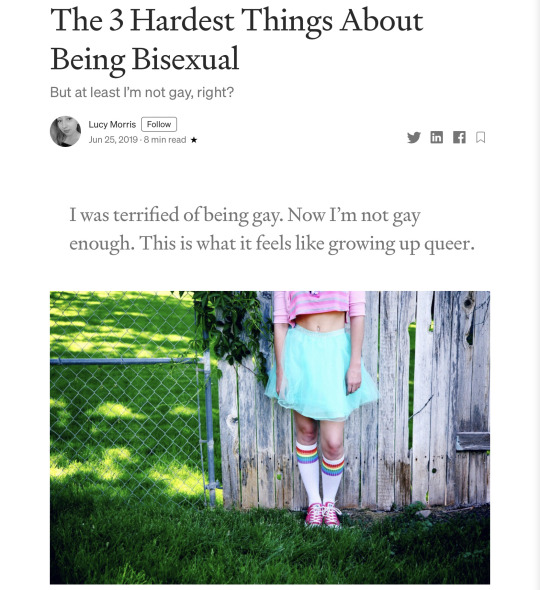
“QUEER”
First of all, let’s clear up a common misconception. Queer does not just mean gay. It’s an umbrella term for an identity which deviates from society’s perceived norm: heterosexual, or straight. Queer can refer to sexualities — gay, bisexual, pansexual, — or it can refer to being gender-queer; i.e, any label that deviates from the perceived gender norm: the binaries, male and female.
“Queer” is a reclaimed slur.
If you do not fall under the umbrella of queerness, it is safe to assume that you cannot use it. At all.
I am bisexual.
This means I experience attraction to plural genders. Pansexual also works fine. For the difference between bisexual and pansexual — see here:
Being bisexual isn’t easy. I went through similar hardships to gay women: I experienced attraction to women and was scared of what this meant for me, in such an oppressively homophobic society.
I am not saying being bisexual is harder than being gay, nor the inverse. But my experiences are distinctly bisexual, not gay.
Without further ado, here are the 3 things I’ve found to be the hardest about being queer, but not gay (enough).
#1: Finding My Place
Or, not being queer enough
I always knew I wasn’t straight, but I didn’t know what I was. Up until recently, I was still questioning. This didn’t feel enough to join groups or conversations with LGBT+ folk, let alone go to pride. Was I even LGBT if I was never L, G, B, or T?
I am still yet to attend a pride, even though I identify (fairly confidently) as bisexual. I am in a relationship with a man. This is (problematically) known as a “straight-passing relationship” and makes me feel even more undeserving of a place at pride.
This has been upsetting to me at times. But for others, it can be outright devastating. Growing up and needing support, but feeling like you’re ‘not gay enough’ to ask for it? So many young people are being left alone and afraid. Finding others like you is vital to figuring out who you are. Likewise, finding spaces which are safe and inclusive is vital for anyone, regardless of their sexuality or gender identity. A friend of mine happens to be a transgender man, and he summed up the issue perfectly:
“One thing that I keep noticing is how all hangout spots are “gay bars”, or (far less common) “lesbian bars”. I’m a straight man, so I don’t feel like I’m supposed to be there, but hanging out at regular bars is still too much of a gamble, so I don’t really have anywhere to go.”
It goes without saying that gay folk aren’t always safe in these spaces, as seen by the homophobic attack on the Pulse nightclub in Orlando, in 2016. Bigotry hurts the entire LGBT+ community. Bigotry doesn’t stop to ask whether you identify as gay or otherwise queer before it pulls the trigger.
But the LGBT+ community itself is much more welcoming to those who “pick a side” and just come out as gay, already. The infighting is inexplicable when one looks to attacks such as that in Orlando: bigots don’t care which letter you are in the acronym. So why does gatekeeping exist when we need to be strong in the face of intolerance when fragmentation only makes us weaker? Who are we helping by continuing to exclude identities from the discussion?
#2: Myths and Misconceptions
Well, it stands to reason that if bisexuals are what they seem in TV and movies, why would anyone want to make them feel included? They’re “greedy” and inauthentic. They’re attention-seeking, not to mention their propensity for threesomes. Now, I haven’t been in a wild orgy yet, but it seems like it will only be a matter of time before I follow my natural path.
Straight men, in particular, need to own up to their assumption that bisexual women are down for a threesome. The thing is, we are. But not with you, you big ASSUMER.
Infidelity
All jokes aside, the stereotyping of bisexuals is not only hurtful, but leads to difficulties finding and maintaining relationships.
As I came to terms with my bisexuality, I also had to accept that I might never be fully trusted by my partner, regardless of their gender or sexuality. I was shocked when my partner reacted to my coming out with the equivalent of a shrug — so much so, that I burst into tears of gratitude that my soul-bearing moment hadn’t been met with slut-shaming or assumptions of disloyalty. Nothing has changed. If anything, our bond is even stronger for me having been more authentic after coming out.
But cruelty came from elsewhere: when I came out, I was told that my partner was to be pitied, either because I’m gay and in denial, or bound to cheat on him. The main consequence of such attitudes has been the crippling fear of coming out to my partner. It saddens me that I felt so relieved when he accepted me for being who I am, and loving him just the same as I always have.
This outcome is not the case for many couples, with straight folk worried that their bisexual partner will realise they’re gay and just leave them. This fear of abandonment comes from a place of ignorance. When the media presents bisexuality as a steppingstone on the way to “picking a team”, it’s no wonder that people struggle to trust their queer partners.
Other Queer Myths
The myth that all trans folk medically transition invalidates those who choose not to do so, and let’s not forget the ignorant jeers that it's all just a mental illness. Asexual folk battle the stereotype that they can never have a relationship and shall forever remain a virgin (because what an awful thing that would be, right?) And pansexuals… well, at the lighter end, they’re asked if they have sex with cooking utensils. But often, they’re erased as irrelevant because “we already have the label bisexual”.
This brings us onto the third and final difficulty that comes with queer folk who aren’t easily categorizable as gay: erasure.
#3: Erasure
Erasure refers to the denial of an identity’s existence or its validity as a label.
Non-binary folk face ongoing and loud claims that they simply do not exist. This is despite the historical and scientific evidence to the contrary. Plus, the most important evidence — them, existing. Asexual folk are told they simply have not found the right person yet, or that they are just afraid of sex. Demi-sexual folk are told “everyone feels like that, unless they’re just sleeping around!”. And bisexuals are dismissed as simply being in denial that they’re gay.
Monosexuality & The Gender Binary
Our culture is so built on monosexuality (being solely attracted to one gender — for instance, gay or straight). Monosexuality is reinforced through everything from marriage to dating apps, the media to what we teach in schools. People cannot fathom that someone might want to experience more than one gender in their lifetime.
The binary models of sex and gender are also deeply ingrained. These rigid belief systems combined are to blame for our inability to accept that bisexuals do not need to “pick a side”. I was paralysed by fear for 17 years because I found girls attractive and that might mean I’m gay, because bisexuals are just gays who haven’t realised they’re gay yet.
Bierasure
Bierasure is dangerous, firstly because it leads a child to have to internalise both biphobia and homophobia. For instance, I had to work through being taught to hate gayness, whilst being taught that any attraction to non-male genders made me gay.
Women were cute, and so I was gay, and this meant I was disgusting.
My own mother told me this. She also told me that something has “gone wrong in the womb” for a child to be gay. (Well, Mum, I’ve got some bad news about your womb!)And she, like any bigot, extended this theory to anyone who experiences same-sex attractions — anyone queer. This is another reason why bi-erasure is perilous. Whether you’re a gay, cis-male or a demi-bisexual, trans woman… if your parents will kick you out for being gay, they will likely kick you out for being any sort of queer.
If we deny the bigotry that bisexuals undergo, we will continue to suffer. It won’t just go away. It will fester, with bisexuals having no one they can go to who believes them. And thus:
Erasure Kills
Bullying and suicide rates of queer-but-not-gay people continue to sky-rocket. We must direct funding, support and compassion to every queer individual, as they are all vulnerable to discrimination and bullying. The problem is being left to fester. This is in part because bigots treat all queer labels as just ‘gay’, deeming them equally unworthy. This is how far erasure can go.
Conclusion
Earlier on, I stated that my experiences are distinctly bisexual. The same applies to any queer identity.
Emphasising our differing paths and struggles is important to avoid the aforementioned erasure of already less visible groups. But this does not mean that the LGBT+ community should be fragmented by these differences.
If we can unite in our hope to live authentically and love freely, we will be stronger against bigotry. We are fighting enough intolerance from without: there is no need to create more from within.
So out of everything, what’s the hardest part about being bisexual?
It’s the fact that nobody knows it’s this hard.
#bisexuality#bisexuality is valid#bi tumblr#support bisexuality#bi#bi pride#pride#lgbtq pride#lgbtq#lgbtq community#bisexual education#bisexual youth#bi youth#support bisexual people#respect bisexual people#bisexual representation#bisexual injustice#bisexual equality#bisexual erasure#bi erasure#bisexual community#bisexual#bisexual facts#bisexual info#bisexual tips#queer#bisexual rights
346 notes
·
View notes
Text
A Bunch of Anti LO Asks
1. I have a lot to say about lo’s writing so here we go:
1) there is so little foreshadowing. I can’t even name one instance other then Kronos being reawakened but that was a literal direct shot of it instead of it being hinted at. There’s very little to none at all ( correct me if I’m wrong.) 2) The pacing??? This all happens in 2 weeks but so much has happened and it’s all happened so slow it feels like it’s been at least a year ( in universe time.) 3) I feel like this has been said enough but using trauma as a way to move the plot along is literally the laziest thing I’ve ever seen.
I’m sorry if this is like hella stupid or something like that
2. i dont get why the writing in LO refuses to let persephone be dark and accepting of death/punishment, because isn't that what you need to show she's going to be a good queen? she seems terrified of the concept and keeps trying to find ways to reverse them, which goes against the whole point of ruling over the dead and even something in myth hades DID NOT like, so its weird to keep making her the opposite of what she's supposed to be? shes just making the case she's not right for the role?
3. apollo/hyacinthus is having such a big resurgence right now that i dont get why rachel didnt include them as friends/a couple persephone cares about and, when hyacinthus dies, have persephone resurrect him. not only would it show her kind nature and sway over hades, but it would also be some actual positive canon gay representation that has legit myth backing. RS obviously got most of her takes from tumblr, yet couldnt take the pro apollo/hyacintus take too? is her heterosexuality that strong :/
4. the whole r*pe plotline was BY RACHEL HERSELF said to not be included, she promised as much, and readers were excited they were finally able to see a depiction of HxP without sexual assault, only for it to turn out she was lying with only a measly "this might be bad uwu" warning on the ep, triggering many people in the process. then she tried to backtrack and claim it was a #MeToo moment, and that irl victims were haters for calling it out. That speaks to who she really is, and it's not pretty.
5. lo hades isnt even cute tbh. what exactly makes him so desirable to make all these women fight over him for? his design is basic (and kinda antisemitic, a guy with a gigantic nose controlling the media and all the banks/money? rachel please), hes not charming or funny, he talks over all the women in his life, never listens to being rightfully called out, he never apologizes or does any self reflection, etc. hes just awful??? like even by an uwu hes misunderstood POV hes just a boring jerk?
6. I think the reason Punderworld or HXP Ficlets doesn't get the amount of scrutiny LO does (and PW is def LO's rival, WT has begged to Feature it several times) is because they had the good sense to never get high and mighty about their depictions, something RS absolutely does all the time. In fact the PW creator constantly promotes over myth comics and loves other takes on the mythos, while RS flips out unless its exactly how she sees it. How she survived school w/ that attitude we'll never know
7. also if demeter was as evil in LO as they want her to be then why would she ever let her emotionally unstable child out into the city with no supervision and no way to contact her? Why would she be going through all this trouble including putting her own welfare into question like trying to keep persephone out of harms' way via the cruelty of thee olympian men and out of jail (WHERE SHE BELONGS) if she's the big bad? Why even make her abusive and evil to begin with? Can't Persephone love both?
8. even if lo needs a villain (which it doesnt but w/e) must it be apollo? or leto? or minthe? or anyone for that matter? if you need some ~drama~ just use eris? she doesn't need some tragic backstory, she's an asshole for the sake of being an asshole. you could so easily have her basically be like TMZ causing discord through her popular blog and causing shit because she can. LO shoots itself in the foot by trying too hard to be deep and thought provoking when its as deep as a puddle.
9. less persephone/hades and more dionysos/ariadne: whats more romantic? a man kidnapping his underage niece and her friends crying themselves to death over it (cyane) or ariadne being dumped by her first boyfriend only to come back with some serious bling and a hot divine partner that is at least the physical equiv of her own age? (dionysos is usually depicted as mentally/physically quite young, so the godly age gap is less creepy/statutory-y)
10. vis a vis the sexual assault anon: it is also something that happens with horrific frequency to trans people as well. the number of trans reports of sexual assault that get thrown out per year by sample size is almost 5x the amount of cis female ones. LO already has some weird terfy undertones with the fertility thing, but just because it happens less (or rather, is reported less) by cisgender men doesnt mean it happens the most to cis women.
27 notes
·
View notes
Text
EXPLAINING SANREMO
(PART 1) Last week I was swept away, helpless, by the avalanche that is the Sanremo Song Festival and I am still recovering. For your safety, I’ve tried to keep the insanity contained on my Italian side blog. But I want to try to offer you a rough summary of what I’ve learned. Sanremo inspired the Eurovision Song Contest. Over five nights, 24 acts, each with a brand new song, compete at the Ariston theatre in Sanremo for a tacky little golden lion, and the glory of being the year’s Song for Italy. 2020 marked the 70th Sanremo, so depending on who you ask, it’s a venerable national treasure or it’s stale and embarrassing (Many Italians are sick of it. Or say they are, but see below.) It is also an EPIC STRUGGLE between THE FORCES OF GOOD AND EVIL FOR THE SOUL OF HUMANITY Let’s meet some of the protagonists:

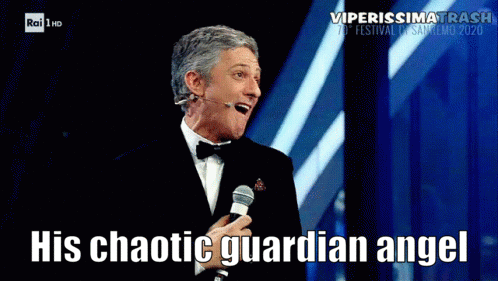
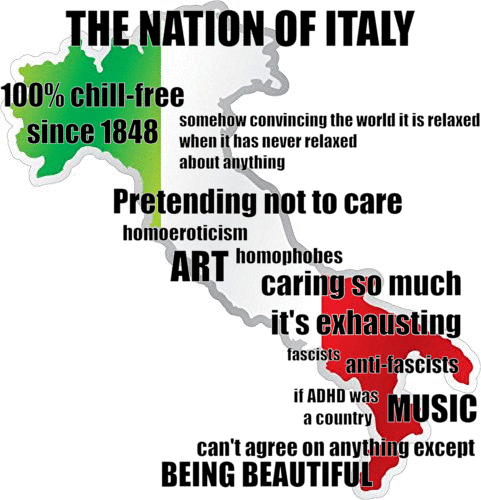
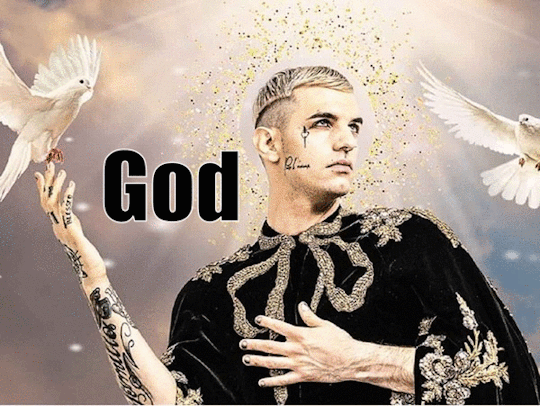
AKA: host Amadeus, entertainer and comedian Rosario Fiorello, il Bel Paese, and competitor Achille Lauro.
Amadeus got things off to a bad start before the show even began by praising his various female co-hosts - all seasoned TV professionals - for their beauty and their ability to stay “a step behind a man.” Outrage ensues, Amadeus claims he did not mean it like that, but keep this in mind for later. Also competing are Morgan (below, left) and Bugo (below, right.), who are performing a duet.
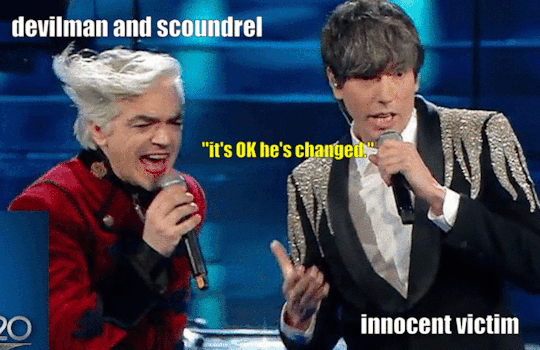
Going in, the one thing I know about Morgan is that on more than one occasion, he trashtalked my beloved and blameless Fabrizio Moro. So I hate him and want him to suffer. And apparently he has quite the reputation for throwing tantrums, picking on fellow-artists and sabotaging events he’s part of. But hey. He’s supposedly talented and Bugo clearly thinks he deserves another chance. And we’re off!
Irene Grandi kicks things off with “Finalmente Io” (“Finally Me”). But I’m starting with her not so much because she’s the first to sing as because I don’t think the song’s got enough attention -- either for the fact that it bangs or for what it represents in the drama that’s about to unfold.
Finalmente Io is what, in the business, we call foreshadowing.

There’s a magical thing that happens to women with when they turn 40. The develop Not-Giving-A-Fuck superpowers. The song is basically about that. It’s about freedom, and self-acceptance, and being 100% done with male bullshit. (It's also a bit of an ADHD anthem but let’s leave that aside for now.) “I’ve lost all my patience, and all my fragility,” she sings.
And, “If you want sex, let’s do it now. Heeeeeeere.”
Irene is the portent everyone misses, a harbinger of what is to come.
Think of her as John the Baptist. Onwards. So the first thing one discovers about the Sanremo Festival is that just because we have to get through 24 “big” acts AND 6 (?) new/junior artists, and they all have to perform multiple times, that doesn’t mean there’s any RUSH. Guest singers wander on and perform a song or ten. There’s comedy. We can stop everything to talk about football. A lady comes on and talks for a million years about how her granny taught her that True Beauty is Found Within. There are also speeches about important subjects like violence against women. In fact, we are going to talk about that a lot, but also a bunch of competent and experienced female TV personalities are stuck taking turns at playing Amadeus’s Glamorous Assistant of the evening and he can’t shut up about how beautiful they all are while they cringe and lean subtly away from him. So it’s ... slow, and awkward, but within its own cheesy terms, things are normal. Too normal. Enter Achille Lauro.
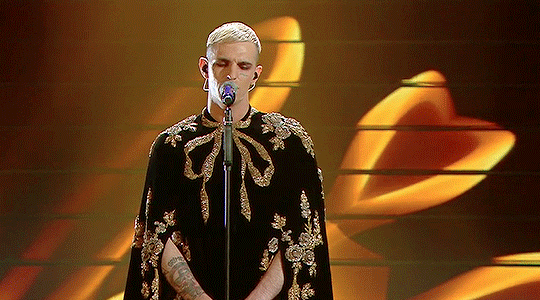
Softly, almost whispering, he begins to sing a song called “Me ne frego” (”I don’t care” - but with an edge of “fuck you”). This is both an everyday Italian expression and a fascist motto. Well, it was till now.
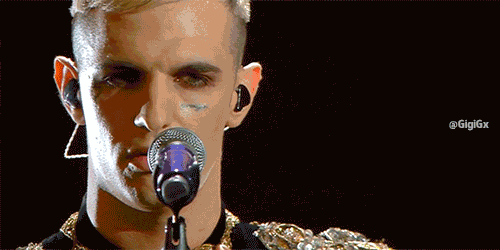
A nation is convulsed. Right-wing Italian boomers are screaming because YOU! CAN’T! DO! THAT! AT! SANREMO! THERE! ARE! CHILDREN! WATCHING! Italian Tumblr, which like the rest of Tumblr is feral, thirsty and gay, is screaming for different reasons entirely.
Achille, you scandalous creature, what have you done? What have you got to say for yourself?
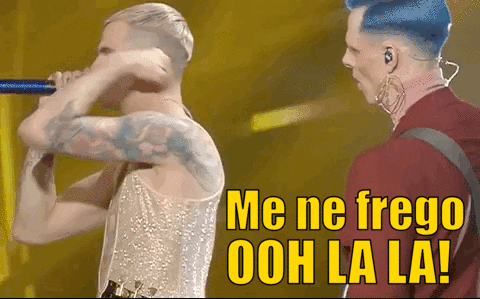
Something strange and magical has released and it cannot be contained. On with the songs. Good songs, bad songs, blah songs. I like “Tikibombom” by Levante - a love letter to weirdos and rebels, “Rosso di Rabbia” (Rage Red) by Anastasio about being, well, angry but scared you can’t do anything useful with it, and “Eden” by Rancore, about... the nature of sin?? touching on everything from September 11 to the mafia to Snow White and the Seven Dwarfs. However, this contest is being judged (mostly - it’s complicated) by an industry jury of FOOLS, COWARDS, and TRAITORS who KNOW NOT WHAT THEY DO, so virtually all of the above artists are so far languishing towards the bottom of the provisional rankings. Achille ends up in 17th place and Rancore at 22.
Truly, the light hath shone in the darkness and the darkness knoweth it not.
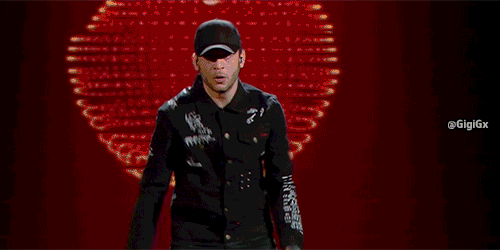
LOOK WHAT YOU’VE DONE TO RANCORE.
Rapper down, repeat RAPPER DOWN. SEND HELP.
However, for people who went in implacably biased against Morgan, it’s not all bad news. "Sincero” (Sincere) by Morgan and Bugo is in last place. Whether this is anything to do with the song or because Morgan is a nightmare of a person who has systematically alienated everyone in the Italian music industry except the trusting Bugo ... we can but ponder. Sanremo grinds on. Days blur into each other and I’m not even going to try to cover events in exact order. Sanremo knows no order. Sanremo is like the universe, linear time is a construct that doesn’t really exist, and chaos happens very, very slowly. But meanwhile, somewhere on the astral plane:
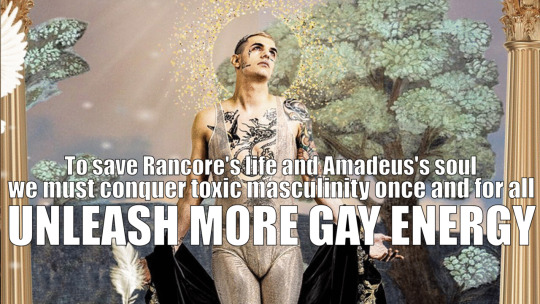
At least that is what I deduce must have happened.
The competitors and guests look deep within themselves. Do they have what it takes? Are they ready to answer the call?
Let’s see! It’s Covers Night! Which is also Duets Night!
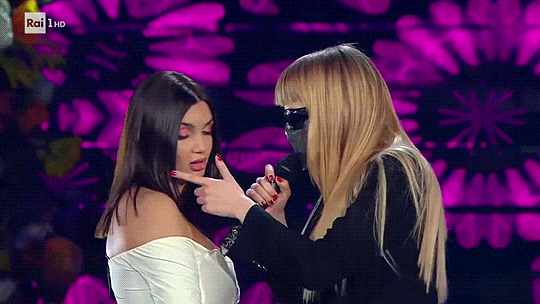
That’s Elettra Lamborghini (yes, that Lamborghini) and Myss Keta.
Are they in tune? No. Does it matter? ALSO NO.
Meanwhile ... something strange is brewing between Amadeus and Fiorello...
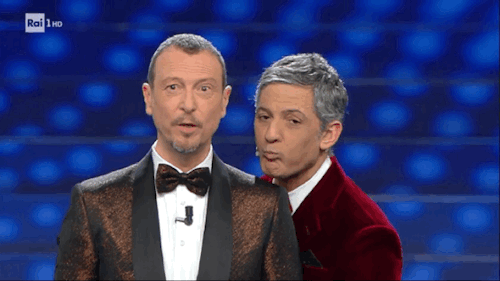
But wait, PLOT TWIST.
Enter Roberto Benigni.
The beloved actor and director is the latest avatar of the Dionysian frenzy that has chosen Sanremo 2020 for the place of its birth. He is the One who will unite the electric queer mayhem and the impossible grinding tedium of Sanremo. In him, the two strains will fuse and become unstoppable. He is going to talk about sex for twenty-six minutes

He reads from the Song of Songs, which ... I knew it was sexy, and all, but is it really like that? Do you ever think about NAKED BODIES? Roberto does. Do you believe in PHYSICAL LOVE? Roberto wishes you would. Anyway, just think of all the sex we could all be having, literally right now, right heeeeere, whether we are “a woman, and her man. Or a man and his man. Or a woman, and her woman!” He is awful. He is magnificent. He is excruciating. He is spellbinding. We are hanging on his every word and we are considering chewing our own arms off to escape. He proposes an orgy in the orchestra pit.
Hand on heart, all of that happened. Italian Tumblr, bear witness.
And what of Achille Lauro? He unleashed this madness upon us all, is he just going to sit back and let everyone else do all the work? Of course not. Achille Lauro came to bring not peace, but a sword, to the world of toxic masculinity and gender in general and his work is not yet done.
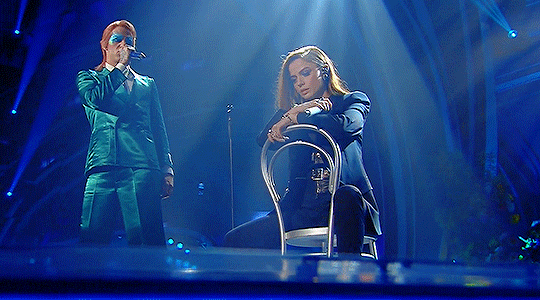
”I too was once a little girl,” Achille sings.
Dressed as Bowie-as-Ziggy, Achille duets with Annalisa on “Gli Uomini Non Cambiano” - “Men Don’t Change”. It’s a heartbreaking song by Mia Martini from 1992 about male abuse of women, and not a single word, or a single pronoun has been changed.
However, although he’s the one in the competition, and the one dressed to dazzle, he leaves Annalisa the spotlight. It’s like she’s the tortured protagonist of the song and he’s a voice in her head, a sympathetic spirit who can’t swoop in to rescue her but can quietly affirm that she deserves better than the the hellish treatment she’s singing about. in fact, he pointedly stays a step behind her at all times. And she’s majestic.
Of course, he’s not fucking DONE
He’s still got to sing “Me Ne Frego” again. Can he top the cape-drop? You be the judge.
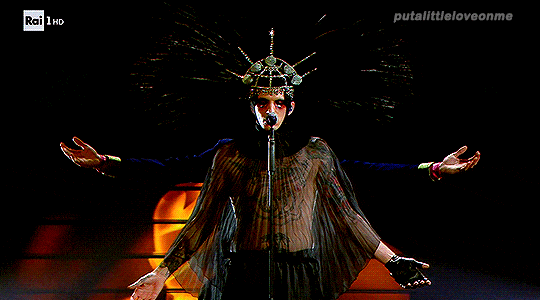
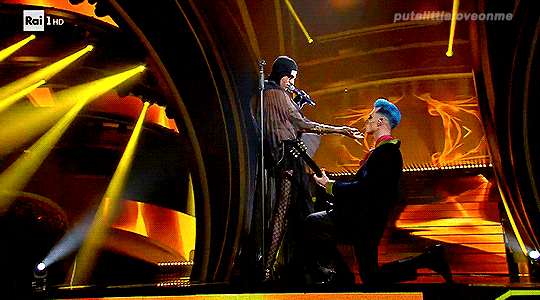
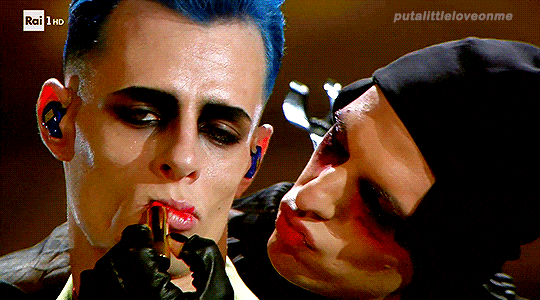
So Italian Tumblr, is now writhing on the carpet, making a sound only bats can hear, and shitposting itself into delirium, but has it all been ENOUGH?
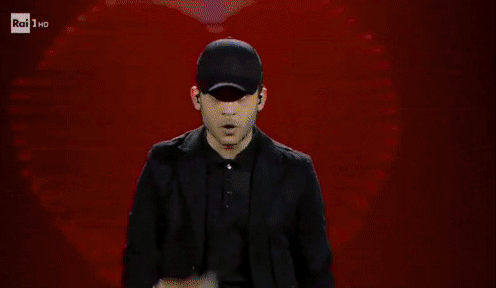
NO.
Poor Rancore has died again. Toxic masculinity still exists. Amadeus is still pretty gross. Everyone is going to have to GAY HARDER. CAN THEY DO IT? This post is, like Sanremo itself, getting insanely long, so ... STAY TUNED FOR PART TWO, in which Fiorello’s true nature as a chaos being is revealed, Amadeus faces his Calvary, and the gun on the stage goes off. ----- UPDATE: Part 2 is here
1K notes
·
View notes
Note
i cannot stop thinking about 'this little queer girl thinks all this 'destiel' is homophobic af' like that seems so straight to me i--- u cannot be in the lgbt community and think its homophobic to ask for representation (also like cas is Canonly gay and inove with dean)
okay i’m not going to question a queer person’s sexuality/identity, no matter how mad they make me. queer people are just as capable of having horrible takes, being bigoted, wrong, and fucking awful people. (however it’s less common than cishet people tyvm we are cooler as a collective)
THAT BEING SAID
some queer people are so entirely focused on being accepted by cishets that they are willing to bend over backwards, betray, and belittle their own community just to seem like a Reasonable Acceptable Queer and therefore not threatening
(to this i say, with my whole chest, fellow queers, CISHETS ARE NOT GOING TO TREAT YOU WELL BECAUSE YOU PANDER TO THEM. if someone isn’t a baseline decent enough person to treat you like a human being in the first place, it ain’t gonna happen. and fuck them, you don’t need them)
this girl in later tweets goes on to say that destiel is homophobic because it perpetuates the idea that men can not be close / good friends without having a romantic or sexual relationship. HOWEVER it literally is not and here is why:
- yes of course men can be close friends and not be in love or fucking. of COURSE they can. queer people asking for representation and pointing out our OWN SIMILARITIES (and queer-coding) to characters is not denying this! in fact, it has Nothing to do with men having friendships!
- THERE ARE SO MANY CLOSE MALE RELATIONSHIPS ON THE SHOW THAT DIRECTLY COUNTERACT THIS. Sam and Cas! Dean and Sam! Bobby and any of them! Crowley and any of them (most of the time), Rufus and Bobby. the fact that spn’s cast is almost exclusively men makes the idea that shipping destiel means NO MEN can be friends ridiculous.
- she says that Dean is straight and this is why Destiel is homophobic. However, if you literally read at all into queercoding you can see he’s been queercoded (acccidentally but nonetheless) out the wazoo. and even if he hadn’t! there’s nothing fucking wrong with people saying I think this character is gay/queer!
- she says that Cas is not human and therefore not gay. Cas CHOSE to be a gay man. He chose to be a man, to inhabit a man’s body, and he fell in love with Dean Winchester. He is a canonically (as far as we can describe due to the fact that angel gender works differently from human gender - not that it matters because we queer people are allowed to relate him to our human selves) genderweird gay man. fuck anyone trying to take that away from us. that’s homophobic. that confession scene was written by a gay man and acted by a [not straight] actor who wrote an ESSAY about his character’s gayness. and again- even if he wasn’t canonically gay- there is NOTHING WRONG with queer people relating to characters and hcing them as queer!
tl;dr: Cas is a canonically genderweird gay man. Dean is a canonically queercoded man. Even if these two facts were not true, there is nothing wrong/homophobic/toxic about queer people seeing themselves in characters. AND we aren’t asking for representation, we already have that representation. We are simply asking to have these characters’ queerness be treated with respect and normalcy, and in turn we and they are getting treated with derision and bigotry.
#spnkakashi#ask#also i am not yelling AT you i hope you know#i am just Angry in general#i agree with you#but yeah#tw: homophobia#destiel#deancas
28 notes
·
View notes
Note
wait a minute. So I've read your bits on civil war 2008, and I have a question for you: all the characters in the civil war event, at least the major players(like stark, Cap, Spidey, FF), do you believe that they are acting OOC, or that the writers chose to bring out the character's worse qualities to create drama?
And do you think that if the writers had written them In Character, or at least written them to be more balanced, would it have improved the story? Actually, do you think that Civil War could have been... at least A not Bad Story under an intense rewrite? or that the whole concept should have been thrown away?
The OOC talk is tempting and also partially justified. There is a batch of previous stories scattered through the years with the Fantastic Four dealing with similar scenarios where Reed is pretty much anti-government.
1) In one Social Services sue the FF4 for endangering Reed and Sue Kids by keeping them in the Baxter Building despite it being blown up once every 2 weeks. They ask them to "register" them and put them in a safe government facility, so to spearhead a new law where they can get pre-teen superhumans "out of harm way" or some shit.
Keep in mind Franklin is still a Mutant in this story (And still is right now because FUCK YOU SLOTT). Anyway, Reed seemingly agrees,only to set up a dummy facility and "register" his kids there. He doesn't even announce it he literally only writes it in the Government's documentation and shit.
The facility is razed to the ground a couple hours later. Because yes the Baxter Building can explode at any time but AT LEAST they are there to protect the kids from the countless people.
2) In another story, Reed is asked by Congress to create a device that outs mutants and "abnormal" humans, so the government can better individuate them for "reasons." Reed agrees, and makes a device SO POWERFUL it detects every deviations from the supposed norm, so when he gives a demonstration in Congress, he reveals half of its members would qualify as "Mutants" if they kept that line of inquiry, which makes them hastily drop the whole thing. This was intentional, because who the fuck are they to decide who is or isn't not normal?
3) Compare and Contrast with Civil Ear Reed Richards, who is a McCarthy apologist who goes "Logically speaking, we need to listen to the government on this one otherwise we might get burned just like my (gay coded) artist uncle was by the McCarthy Trials in the 50s when he told the court to shove it and his life was ruined as a result. It's the rational way to do it."
4) (The three main proponents of the Registration Side being Rich, White, Heterosexual Men in positions of powers, with jobs in the science field that justify their decision with "Facts and Logic" was PROBABLY unintentional, but is also a great unintended allegory for this kind of shit. The ones who are hurt the most but these kind of laws are the ones who can't afford it after all, and who is ever going to go after the rich and powerful first? Especially if they come with little repercussions on their lives (Tony, Reed and Hank where all already outed as Superheroes after all))
5) Peter is OOC in OMD mind you, Civil War goes pretty much how you'd expect him to go (gets manipulated by authority figure into it, MJ and May are supportive of him because they see only half the facts, the SECOND Peter realizes that those people are monsters he drops them and gets the shit beaten out of him for it, unlike Reed or Tony who can AFFORD having their identities public Peter barely has the money to survive which ends with May getting shot for it). It's an incredibly poignant scenario that I wish was used to TELL A MESSAGE rather than just a backdrop to shoehorn OMD in.
6) Which is to say Civil War could indeed be written better under the same premise. If they want to keep the Patriot Act Allegory, they should be aware of what that would entail for the characters that support it.
We are currently seeing a similar scenario going on in Marvel in the Champions comics where the registration side is pretty much spearheaded by an unambiguous evil corporation and shit. In light of Civil War I existing the whole thing kinda loses its impact (Like that one joke scene where Tony goes "Maybe we should register them" with a smug look on his face as if he isn't responsible for so many deaths), but at least they are trying to shift the conversation? The villain is not the Government of course it's Evil Apple, but at least it's not a "Both Sides are equally ok" centrist bullshit take like they did in Civil War or in Skyrim.
Like, fuck, it's literally called CIVIL WAR to invoke the American Civil War in the context of the "brother kills brother" interpretation some bastards are so fond off, I wouldn't call THAT a "Both Sides are valid" scenario by a long fucking mile, yet here we are.
7) I think the best way to put it would be to set up the same scenario but make it realistic to the setting and shit.
Hank and Tony still support the Government because one is a Skrull Chaos Agent the other is misguided, Carol takes Reed's place in the Triad because Women can be War Criminals too (She was leading the equivalent of a child soldier program during Civil War so she is one already at least). Steve is also anti government because this is happening during the fucking BUSH ADMINISTRATION and he goes "When will Washington decide who the villains are?" Like he did in canon but in, like, a poignant moment.
Speaking of Reed he will keep his family neutral and go "I admit superheroing does need failsafes and some kind of oversight mind you, I just don't this this country's government has demonstrated their right to be that."
Let's not put the "Cap you are out of touch because you don't know what MySpace is" or "Luke every time I see a Sentinel that's like seeing a Burning Cross" rants in the story too because those were some raw shit.
Tony, again, lives in privilege, so it wouldn't exactly affect him, and is genuinely trying to do good, so we need to put him as the "Patsy" who gets duped by Skrull Hank Pym for it, the government is the one with the secret prison for Superheroes, Hank is the one recruiting Nazi Scientists and starting child soldier programs, clones Thor, sets up with the Government a Super Prison in the Ocean (can't use the negative zone without Reed), outside of US Jurisdiction so the government can ship then there with no trial and torture them. When Skrull Hank Pym is confronted for it, and the blame is attempted to be pinned on him and him alone, he goes "Are you earthlings daft or something? I did almost nothing, it was your government who did most of the work in their desire for security and safety, I just sped up the process for them, they would have done all of this with or without me."
Around the ending Tony finds out and is devastated and drops the whole thing."
When someone tries to comfort Tony over it because he didn't know any of this he goes "Oh, that's were you're wrong Peter. I knew. Deep down, I knew things weren't right, unjust, but I did nothing, because I could make things better from the inside, because it didn't affect me, because It would have been inconvenient to me to stop this. This is on me for passively accepting it as it is on the ones who enforced it." Which leads him to make amends, that way he is not as much of a awful character here.
The scene where The US kidnaps Ororo so they can strong arm Tchalla into getting registered happens but is treated as a international crisis as it deserves.
The Prison Break finale happens because Namor discovers the prison in HIS FUCKING DOMAIN and just goes ham on it with the help of the Anti Registration side, he drops a line like "I've seen shit like this before, I've seen what happens when man declares another man a criminal for things out of their control, for what they've been from birth, and I say NOT IN MY KINGDOM!" or some shit (He is a WWII veteran after all).
Since Steve isn't pummeling to the ground Tony in this scenario there isn't the dumb as fuck Everyday Heroes scene and he doesn't get shot by Sharon later on..
We have instead the scene from Secret Invasion where Skrull Hank Pym kills Steve (In SI it was Skrull Queen killing Janet Van Dyne) on national television, which leads to the anger of everyone involved who rush him, only for Tony to be the one who pull the trigger.
Tony is put in charge of SHIELD, which leads to Iron Reign (Dark Reign equivalent), and the story ends with him going "Let's see if things can reach change from the inside this time" as he actually reforms Shield from his position of power. The Registration Act becomes unpopular due to Steve's death and Alien Interferences, so that helps, and leads to actual protests in the streets after Namor reveals to the UN the war crimes the US is committing. It's a slow process, but is something.
OMD doesn't happen, The Peter storyline remains pretty much the same, but instead of Tony bragging about his private prisons for Superheroes in hell, it's the Punisher who shows up to him and reveals some troubling shit he discovered, Peter Confront Tony for it who dismisses it as fake news because he doesn't want to believe, Peter drops the registration side out of disgust, which then leads to the government sending villains after him rather than Tony. Tony is then seen strongly arguing with Maria Hill for this since Peter almost died from what he got from his suit readings (which he never hijacked or deactivated), but the Skrull Hank Pym shows up and supports Maria Hill for it, and Carol is busy with her child soldier program to comment.
May still gets shot and dies right as Peter and MJ discover MJ is pregnant with their second Daughter, which is ripe for lots of good stuff.
Maria Hill will therefore have to take even more of a role as a Government Plant and shit, but what's new.
Johnny Storm still gets hate crimed on but not by black people. Maybe confirm him as Bi while we're at it? You know, to get topical and all.
Ideally No More Mutants never happened so mutants are still a thing and most of them are vehemently anti registration. Emma Frost appears neutral at first glance, but ultimately she is playing the long game, secretly helping militant mutant groups and shielding the school from unwanted attention. She still has a restraining order filled for Tony Stark, she still points out to Carol how fucking dangerous a mutant life can be if outed via mind powers.
Can't think of much else for now, maybe Felicia helping MJ and May while they are in hiding? MJ is nauseous and all and she goes "must be the nerves" and Felicia agrees but May knows. This could lead to the polycule post May death since Felicia blames herself for it for not being fast enough, and MJ now is pregnant and scared and the Registration Act is getting repealed by the future is still glum and Peter is depressed so they all comfort each other and then 69 issues later we have a two parter maxi event where they face their fears and BANG we get the polycule.
Aunt May still poisons the Chameleon while he was posing as Peter. She actually actually poisons him rather then just drug him this time, because she knows of that one time he tried to force himself on MJ while posing as Peter which lead to MJ beating the shit out of him with a baseball bat, and May is a nice old lady but there are things she really can't stand you know?
Felicia and MJ help her hide the body. Peter never finds out.
And that's it?
16 notes
·
View notes
Note
I feel like I picked up on most of the racist tropes in Maas’ books but I’d love to hear your thoughts on the homophobia in them
Hi Non!! Thanks for the ask :)
Just an fyi if people didn’t see it, Anon is referring to my tags on this post about death of the author and the importance of criticizing media without taking into account the creator’s intent.
So yeah, regarding Maas. There’s a lot of ways in which I find her writing homophobic, I’ll divide them in different categories to try and make it clearer because my mind works in twisted ways x)
You should also know that I haven’t read Crescent City past the first few chapters so I can’t talk about this book (what I heard isn’t great regarding this issue but I haven’t read it so I won’t comment on it)
(this got long so I’m gonna use a read more)
worldbuilding
I think her worldbuilding tends to reflect a homophobia that she might not be aware of. Her entire world is built on heteronormative ... norms (lmao sorry I don’t have a better word I haven’t slept in more than 20 hours) that don’t leave any space for queer people to thrive in.
Throne of Glass actually got the less awful bit on this one, we’re shown that Hasar’s girlfriend Renia would become Empress if Hasar was crowned, and Aelin’s uncle was openly gay, so I guess compared to ACOTAR it’s better.
ACOTAR gets the worst of this: The fae society is painfully mysoginistic and by extend, homophobic. Mor is basically sold into marriage at sixteen, to a man, without regards of how she feels about it, because women are considered a breeding stock. The Illyrian women are viewed in the same light. Even Feyre is expected to be making heirs when she’s about to marry Tamlin. Yes, all these examples are painted as bad things in the books, but it doesn’t take away the fact that there are also considered normal within the society we are presented with. When the entire world is built around cishet dynamics (whether good or bad), it shows us that queer relationships are not the norm here, they’re outsiders from their own society (btw considering women as ‘baby makers’ is also transphobic but I’m not gonna open that can of worms).
The mating bond in itself is the biggest heteronormative concept in her books. As Rhys explains it in ACOMAF, it is literally intended for couples to make the strongest babies. It doesn’t care about love between partners, its primary goal is to perpetuate the species. It’s a natural instinct that we’re shown is basically impossible (or at least very difficult) to fight against. We’re shown that the woman has to make the man a meal to “seal the deal”, we’re shown that men become extremely violent towards other men they consider a threat when they’re influenced by the bond (by the way that’s toxic masculinity but it’s not what this post is about).
I believe that Maas didn’t intend for the mating bond to be a possibility between mlm or wlw couples, but that she retconned it in ACOWAR. Which in a sense is good, I’m all for queer soulmates! But the concept she invented here doesn’t have much room for non heteronormative relationships, and it becomes painfully obvious when you try to apply the mating bond logic to wlw/mlm couples. It brings many questions to mind: if it’s intended to make babies, does it mean that the mated mlm couple has one of the men be a trans man? If that’s the case, why didn’t she tell us? Why didn’t she spend more time on telling us their story? If they’re both cis men, then why would they have a mating bond, something specifically designed to help with species continuity by making babies? To me, it’s proof that she didn’t think it through, she thought it was cute to have two men be mates just like our main couple was, and didn’t stop to consider how the mating bond didn’t allow for this to happen organically because it exists in a vaccum of cishet privilege where she didn’t think about the consequences of including it in her books without elaborating on it.
We can also see that queer people aren’t expected to be the norm in that society. Feyre is genuinely surprised when Mor tells her that she likes women, as if it was this groundbreaking thing she never even considered. I’m not going to get into details as to why I hate Mor’s coming out (I love Mor being a wlw but really, really, hate that scene), but the fact that she hasn’t felt comfortable enough to come out in five centuries is very telling of how unaccepting the fae society is of queer people. So yeah, there’s a queer bar where she hangs out but like... that doesn’t mean it’s accepted. One of the main reasons why queer bars started existing in the first place was to become a safe space for people to be themselves, so you know, I kinda take it as another proof of how unopen-minded the fae society actually is.
lack of queer characters
Overall, we don’t have a lot of confirmed queer characters. Off the top of my head, I can think about (of course I might forget some so that might not be 100% accurate, I haven’t read the books in a long while):
TOG: Hasar and Renia, Aedion, Orlon and Darrow
ACOTAR: Mor, Helion, Thesan, Andromache, Nephelle
Note that I’m not counting unnamed characters. I don’t consider “x’s lover” as a developped enough character to count as representation, come on.
Out of all these characters, only two of them are in the main cast of their respective series (Aedion and Mor). The others go from “mentioned” to “secondary character” at best. I’m not saying that all of her characters have to be queer, but out of such a big cast of mains, one in each series seems very little.
construction of these characters
On top of not having many characters that aren’t cishet, the characters we do have aren’t very well handled by the story.
Hasar is repeatedly described as being ugly, despite most of the other characters being described over and over as breathtakingly beautiful.
Aedion compares bisexuality to forced prostitution.
Helion is basically shown as sleeping around with everybody.
Mor’s sexuality is kept so ambiguous that there’s debate as to whether she’s actually bi, or rather a closeted lesbian.
Renia barely talks, Darrow is a jerk. Orlon, Andromache and Nephelle are figures of the past that we never meet
This is a problem mainly because of how small in numbers the queer characters are. The more diverse cast you create, the easiest it gets to avoid hurtful tropes. I wouldn’t mind Helion being a bi man sleeping around all the time if he wasn’t the only bi man in ACOTAR. Nor would I mind Mor’s tragic backstory if we had other wlw characters. By reducing her cast to such little numbers, she’s creating problems in her writing. She’s telling us that bi men sleep around and never settle down, she’s telling us that sapphic women will only get tragic stories and never find love again.
In the end, the combination of a heteronormative worldbuilding and the lack of work put into the queer characters we are given makes it impossible for me to not consider her books homophobic.
To be clear,
I don’t think Maas does this out of malice. I don’t think she’s a homophobe who hates queer people or anything. I also don’t dislike her books. They’re a fun read, and there’s a reason why ACOMAF is one of only two audiobooks I always have on my phone! Hell, I even write fanfic with her characters. But I think it’s important to be critical of her books, particularly in regards to issues such as racism, mysoginy, or homophobia.
To go back to the original post from yesterday, this is why ‘death of the author’ is an important point here. I’m not saying that Maas intended to be homophobic or that she built her world expressedly to exclude queer people. But in the end, that’s what happened, and we can’t brush off the critics of queer people and people of color just by saying “well, the author didn’t mean it that way.”
I do think that she includes queer representation only as an afterthought in her books, and it shows. Mor’s coming out was poorly handled because she didn’t consider the ramifications of it, just like the mating bond suddenly applying to queer relationships. Her societies are based on cishet white upper class America and that leaves little to no place for queer people (and people of color) to thrive in her stories. From what I see, she doesn’t seem interested in consulting with sensitivity readers over these issues, and as long as she doesn’t swallow her pride and listen to the people that are affected by it, she’s not going to get better on these points.
#Anonymous#Asks#anti sjm#I guess?#I don't consider this to be anti it's just a discussion#but I get people not wanting to see negativity so I'll tag it#I'm not dwelling on the racism because that's not what anon asked#and also as a white woman I don't feel like it's my place to dwell on this#there are other bloggers that addressed it much better than I ever could#I hope this post is clear omg I rambled on for so long lmaoooo#I'm always opened to discussion by the way!! as long as you stay civil I'm willing to listen to any point of view#pinned post#sjm critical
117 notes
·
View notes
Text
It’s Time to Talk about a Bespectacled Elephant in the Room
I’ve been in the Beatles fandom for 8 and a half years. I have had a Beatles blog for the entirety of those 8 and a half years, and I have watched as discourse about these four men evolve. The discourse inside and outside the fandom has become so toxic that I don’t think I can engage with it in the same way that I could before. Let me explain.
When I entered this fandom 8 and a half years ago, it was in 2012, quite an infamous year in tumblr history. That was the pique of “”cringey”” fandom culture. The Beatles fandom was as steeped in fandom culture as any other fandom. I know this because I was part of two of the top of fandoms at the time, Doctor Who and Sherlock. Believe me, I have seen cringe.
The fandom at the time was totally aware of the John, Paul, George, and Ringo’s flaws as individuals, but most fans tended to simply enjoy Beatles fandom as if it were the 60s. Some might call it ignorant bliss. If you asked me at the time, I’d have said it was self-aware ignorant bliss--if that even makes sense. At the time, there wasn’t a person with a Beatles icon who hadn’t heard the line “John Lennon beat his wife.” Everyone knew it, but everyone also knew the real story, and so everyone just made peace with it. As a result, people didn’t think about every bad thing the Beatles ever did on a daily basis. It was more like a once-a-month kind of thing. Otherwise, fandom discourse was quite fun and relaxed. There were no shipping wars, no one fought over who was the best Beatle, everyone gushed over the Beatles wives, and we all just had fun with fics and fan art.
Of course, in this period, people engaged in conversations about one bespectacled Beatles problematic behavior. These conversations usually came from outside of the fandom. It was usually randos coming into the tags or into someone’s ask box and ranting about John Lennon’s violent behavior. Some of it came from within the fandom. Some people really didn’t like John and gave others shit if they listed John as their favorite Beatle. A lot of the discourse boiled down to: ‘hey, I see you like John Lennon. You should know that he beat his wife. And now that you know that, you should feel bad about ever liking him in the first place.’ And the response was often, ‘Actually, John Lennon didn’t beat his wife. They weren’t even married at the time. And also he didn’t beat her, he slapped her once in the face, and then never did it again.’ No one’s minds were changed. The fans had made their peace, and the antis came off as cynical and pretentious.
When Dashcon happened, and Tumblr took a hard look at its cringey fandom culture, the Beatles fandom evolved as well. The fandom became, frankly, less fun. It no longer felt like a group of people who found the Beatles decades after the 60s and were fangirling like it was 1965. There was still some of that left, but a lot of it kind of faded. So, most fandom interactions were reblogging pictures of the Beatles from the 60s and various interview clips and quotes. But the barrage of antis never really went away, and the response didn’t evolve.
Then, the advent of cancel culture came on. I always waited for the Beatles to get, like, officially canceled, but I also felt they were uncancel-able at the same time. Let me explain. I have been a Beatles fan primarily in an online space, rarely engaging with fans in real life. But I have met fans who are life-long Beatles fans, people who are a lot older than us and who’s fandom isn’t tied to the internet. They don’t give a shit about any of our discourse. They may or may not have heard it before, but they seem totally indifferent to all of it. I’m sure most of them have never heard ‘Mclennon’ before. These are the people that flock to see Paul McCartney and Ringo Starr in concert (and pay astronomical prices for it). These are the people who go to record shops and buy vinyl. These are the people I run into at flea markets who buy up all the Beatles merch before I can even arrive (true story). So, the Beatles will never be canceled because there will always be people who love the Beatles and don’t engage with online discourse. Rarely said, but thank god for Gen-X.
As cancel culture took over the internet, fandoms changed. It’s not as noticeable in fandoms without problematic favs. For instance, I’m also steeped in the Tom Holland fandom, and that boy is a little angel who has done no wrong. No one has discourse about the unproblematic boy who plays an equally unproblematic character. But in fandoms with ‘problematic favs’ the mood has shifted. I’m also in the Taron Egerton fandom. Taron Egerton, for those who only follow me for my Beatles stuff, is a genuinely sweet and kind person who has had zero scandals in his six year career. There were some rumblings when he was cast as Elton John, and some people took issue with the fact that he’s a straight man playing a gay man. This discourse seemed to die quickly as a whole lot of straight people played gay people in that same year (Olivia Coleman as queer Queen Anne, Emma Stone as her queer lover, Rami Malek as Freddie Mercury). Why jump on this boy who at the time was still technically on the rise. He’s not exactly the same target as someone like Scarlett Johansson who has her pick of roles. Taron doesn’t have quite that some power in Hollywood, and I think most people made peace with the fact that this was a big role for him, and it’s not really fair to take that away from him. So, all in all, the closest thing to a scandal was something that died pretty much on arrival.
That was until this summer when everything changed. When George Floyd was murdered, celebrities flocked to social media to mourn his loss. Taron’s social media account was silent. For weeks, Taron said nothing about Black Lives Matter or Floyd’s death. This caused outrage in the fandom. Many raced to defend him, starting a hashtage #IstandwithTaron. Others sought to tear him down and anyone who supported him. The kind of mania this one incident caused tore through an otherwise peaceful fandom. What I saw was two sides in a total panic. The antis were people who once had faith that Taron was a good person and were now questioning that. Andthe defenders were people who desperately wanted him to be a good person and were afraid that he wasn’t. In essence, both sides could feel Taron about to get canceled. The defenders wanted to stop it, the antis wanted to ride that wave.
What this long drawn out Taron example is meant to convey: is that cancel culture has put fandoms on edge. One’s fav has to be perfect, otherwise it can jeopardize the existence of the entire fandom. I’ll admit, I was afraid that I’d be some kind of pariah for standing by Taron through all of this. My actions were to basically reason with the antis but still defend Taron. I defend him mostly because I felt that his silence was the result of a needed social media absence and that trying to shame him back onto social media was an invasion of privacy. But I was genuinely afraid that he would get canceled, and the fun of the Taron fandom would be lost.
In the Beatles fandom, it often feels like the Beatles, mainly John, have already been canceled. I see this coming from two different sources: antis from outside of the fandom and antis within the fandom. The outside antis are just the same as the ones from 2012. These are people who like to drop in that John Lennon beat his wife, posting this in the tag (which violates an ancient tumblr real by the way--no hate in the tags).
The antis outside the fandom speak to a larger anti-John Lennon sentiment online. I see references to John Lennon ‘beating his wife’ on Tiktok and twitter. The tone of anti-John Lennon posts has shifted. Before, it felt like the antis were being smug but also argumentative. They wanted to have a conversation about this bit of info they read on Reddit with no context. Now, “John Lennon beating his wife” is practically a meme. It’s a running joke online that John Lennon was a wife beater. I can’t look on my instagram explore page because every so often a John Lennon beats his wife meme will pop up amongst the other, normal, memes.
This change in discourse suggests that the internet has just accepted this as fact now. I should note that back in 2012, it seemed as if few people knew this fact. The fandom knew it, and these random antis knew it, but few others did. Now, because of how common these memes are, it seems to be widespread knowledge.
Consequently, the Beatles fandom, who used to ward off attacks from antis, seems to have given in. I recently saw a post from a Beatles blog (had the URL and icon and everything) that confessed they felt guilty for listening to the Beatles, and I’ve seen similar sentiments expressed in the fandom. People tend to put disclaimers in posts about John or even all four that John is an ‘awful man.’ It seems like the self-aware ignorant bliss has completely gone away. Occasionally, I still see posts joyously talking about Mclennon or reblogs of old photos from the 60s. But the culture has shifted.
Online, it no longer feels comfortable to be a Beatles fan. It feels like you have to own up to 8 decades of mistakes by four men you’ve never met. And, I should note, this is kind of how it feels to be a fan of anything right now. Taron is not canceled today, but he could be tomorrow. It’s this pervasive feeling of guilt that the person you’re supporting may or definitely has or is doing something wrong.
I’ll admit this uncomfortable feeling has expanded into other parts of my fandom life. I listen to their music, and I feel elated--the way I always have. Then, I get these intrusive thoughts which sound like all the worst parts of Twitter combined. It wasn’t always like this. Back in 2012, when I knew almost nothing about them, I saw them as four young men who were full of happiness, love for another, and talent. Back then, listening to their music was exciting and joyous. Sometimes, I fear that I can never feel that way again. Next year, when I finally go to Liverpool, will I be filled with excitement or guilt?
I say all this for a few reasons. One, I love John Lennon. I appreciate all the good he did for the world not just as a musician and an artist but also his advocacy and charity work. I love him, and a part of me will always love him, but observing the change in discourse has enlightened me as a historian. Part of my job is to observe people’s legacies, and John’s is perhaps the most interesting legacy I’ve ever observed. When he died, he was hailed as a saint. But tall poppy syndrome set in, and the antis started. This culture grew and grew to the point where it seems to, at least among the younger generation, taken over the sainthood.
But as a historian and a fan, I have never seen the saint or the devil. I’ve only seen the man, the incredibly flawed man. The thing that these antis never understand is that John Lennon was painfully aware of his own flaws to the point where it made him all the more self-destructive. In essence, his past mistakes caused him to make additional mistakes. But John, aware of his own flaws, always tried to change and was often successful. I’ve talked about this before, but John demonstrated that he was capable of being a good person, like properly so, again and again. After he struck Cynthia, he never hit her again. His shortcomings as a father to Julian weren’t repeated with Sean. He worked on his drinking, his drug addiction, and his anger, trying to overcome those demons till the day he died. By all accounts, the John Lennon that died in 1980 is not the John Lennon who struck Cynthia Powell at school. That John Lennon was living a cleaner, healthier life. He was a better father to both his sons by that point, and was trying to repair his relationship with Julian. He was a good husband to Yoko and saw himself living a long and happy life.
John Lennon cannot and should not be boiled down to just his flaws. It’s one thing as a fan to acknowledge that John is a flawed human being (news flash: they all are), but he is also much bigger than that.
So once again, why am I writing this long, rambling post, once again talking about John Lennon’s virtues? Because if I can’t engage with healthy discourse about the Beatles and John Lennon, then I can’t engage with discourse on the topic at all. So, I probably will post less Beatles stuff because I find it hard to go through the tags or even my dash (well, I can’t really go through my dash anymore for other reasons I’m not going to get into right now). If any of my followers have noticed a lot of Taron posts lately, it’s not just because I love Taron, it’s because Taron’s tag is pretty much the only location on tumblr I feel 100% comfortable in. Any foray into John or the Beatles tags becomes uncomfortable and guilt-ridden quickly.
So, I probably will post less about the Beatles until I can find a blog or a tag that doesn’t give me bad vibes. My fandom will likely outgrow tumblr and the internet. I have a ton of Beatles books; maybe I’ll rely on those. I am doing official scholarly research on them now. Maybe that will be my outlet. I’m sorry if I post less about them now, but it’s really for my own well-being.
55 notes
·
View notes
Note
1.Hey just want to let you know that I am the first anon who asked about Jensen Ackles and Tyler Posey - I don't know which teen wolf anon you assumed I was, but that was the first time I send you an ask. I am a TP fan and check your blog for TP stuff and was surprised to see you reblogging jokes about Ackles being homophobic - since I see him facing the same issues that Posey did - a toxic fandom that bullies actors just because they don't subscribe to wanting two hot white men to get together.
2. Same anon. I don't think we should be throwing around words like homophobia lightly or based on rumors about how Ackles made a showrunner change the character based on his preferences etc. Ackles maybe homophobic - we don't know for sure. All I know is that from my experience, the Destiel fandom is as toxic as the Sterek fandom. Sure, Ackles shares part of the blame as he makes hundreds of thousands of dollars off these fans at the various cons - ( contd. in part 3)
3. But that does not mean that actors or their family should be subject to cyber bullying and online hate or that the showrunners should pander to this toxic fanbase. Scott would have been and was sidelined to pander to and queerbait Sterek fans and he was called homophobic when he pointed out how nonsensical the ship was. Destiel is the same and I don't mind Ackles not giving two shits about acting out a badly written scene pushed in to appease a toxic fanbase. Just my two cents.
Okay, first off, I want to say the only anon I've ever gotten that used Tyler Posey and "double-standards" in the same sentence has been the Asshole Anon I tagged. And given the fact that this anon was in my inbox within an hour of posting that ask, it stands to reason that my paranoia is well founded. This would not be the first time they've tried to trick anyone into a "Gotcha!" moment, and I was the next on the rotation of people they harass.
That being said and out of the way, let's get into this.
Starting off, you're right. Claims of homophobia shouldn't be a joke. Homophobia is a very real thing that affects many people around the world. And given the shipping fandoms that habe arisen in the past decade, along with thr use of social media by celebrities, it allows these fans to harass and belittle them from the comfort of their homes, no matter where said celebrity is. I would never make jokes regarding how fans treat the loved ones of their favorite celebrities, because I find it abhorrent. We saw something similar to his happen with the Star Wars fandom, particularly the R*ylos, when they doxxed and harassed Adam Driver's wife in the hopes that he and Daisy Ridley would get together, thus fulfilling the fantasy they have about their ship.
I don't keep up with the actors of Supernatural because I don't watch it anymore, but I imagine that's the case with Jensen's wife. Fans harassing her because she married him and they've based their entire personality and fandom experience around a ship between two fictional characters and the actor's personal life interferes with that fantasy. The fans that are harassing Jensen and his family aren't doing it out of any sense of morality in their efforts to fight homophobia, but because they want to see Dean and Cas together, and can't (or won't) accept that they're fictional characters played by two actors that have their own private lives.
Something similar happened with the Sherlock fandom, when they decided to cancel Martin Freeman and his wife because they asked fans to stop sending them NSFW fanart or J*hnl*ck, especially when they were with their children. I'll admit I'm a little fuzzy on that one, because I've never watched BBC Sherlock, but I did follow a few blogs that did so I remember the discourse. This all just feeds into the idea that shipping fandoms "own" the actors that play their favorite characters and has made for quite a toxic environment on most social media.
If the D*stiel fandom is anything like the St*r*k fandom or the J*hnl*ck fandom , than I applaud Jensen for standing his ground in the face of what I'm sure is countless inappropriate fics and art that are constantly thrown at him.
Now, there are a few differences between how Jensen is being accused of being homophobic and how Tyler was accused of being homophobic. The first major difference is something you said in this ask. They're jokes. Keeping in mind that, yes, I did say we shouldn't joke about homophobia, all the "discourse" around D*stiel has been jokes due to a variety of reasons. From how uncomfortable Jensen looked in that scene (leading some to think they were filmed separately and not told how the other was reacting) to the fact that it was happening during election week before the election was called. The fact that the rumors that Putin was stepping down came out at the same time and the whole situation took on this hysterical, otherworldly quality, like this was a collective fever dream we couldn't wake up from. The jokes came about, breaking the tension that had consumed Tumblr and uniting a large number of people in the absurdity of everything.
There's also the fact that the jokes about Jensen being homophobic were just that - jokes! I'll admit that I haven't gone looking, but I haven't seen anyone calling for Jensen to be cancelled or for his career to be derailed or his life to be ruined because of that scene. No, I've seen countless jokes about how Dean looked constipated or memes of random images found on people's phones used to "recreate" that scene. The fact that Jensen apparently wrote into his contract that his character in The Boys wasn't to have a gay sex scene just added to the satirical nature of everything.
Now let's compare that to Tyler Posey. When asked about a crack ship (that had nothing to do with his character) for the umpteenth time, he said that, if that's what fans were watching for, they're probably watching for the wrong reasons. It never condemned the ship or mocked its fans, he simply said that they were watching for the wrong reasons. And given how this interview took place after filming was done for that season, that could be interpreted as him saving people from wasting their time on something that wasn't going to happen. Personally, I just think he was fed up and frustrated about being asked about a crack ship that had nothing to do with him.
And for that one simple sentence, he was (and still is) deluged with hate. He received death threats and threats against his mother while she was battling cancer, all because he said something that wasn't a glowing appraisal of a ship that the fandom made up. To this day, there are people hell bent on proving how Scott was the true villain of the Teen Wolf series, and how Tyler Posey is just an awful human being.
Did any of those things happen to Jensen? No.
Would those things have probably happened to Jared if he'd said something negative about D*stiel? Probably.
Would the Teen Wolf fandom have acted the way it did if it had been Hoechlin or O'Brien who shot down St*r*k? Definitely not. We know that because they both did say something against St*r*k and the fandom at large likes to pretend that it never happened.
So, as we can see, there is a very clear difference between how Jensen was treated and how Tyler was treated. Could racism play a part in that treatment? Most likely, though, many would never admit to that. But, at the end of the day, its important to look at the differences between these two actors and how they were treated by their respective fandoms for what they said in regards to ships that fans have based their entire fandom experience around.
#anon#fandom homophobia#double-standards#jensen ackles#anti destiel#(just in case)#tyler posey#anti sterek
27 notes
·
View notes
Text
beginners guide to the beatles
made one of these a long time ago but i'm surprised by how short it was. so here we go again. doing it right this time lol.
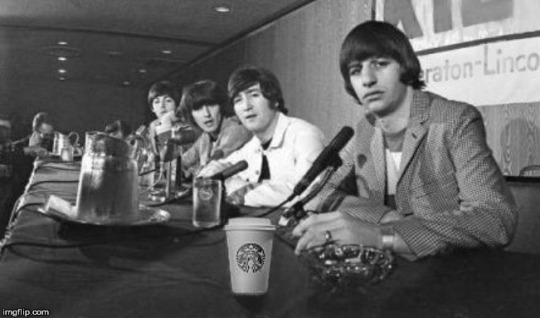
pov: you told a bad joke and now the beatles are judging you.
john winston lennon. later in his life known as john winston ono lennon.
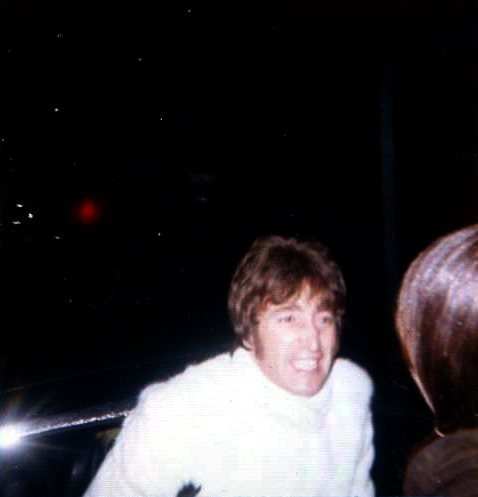
born on october 9, 1940
i believe in astrology bc how does john just happen to be a libra
when john was four he started living with his aunt mimi who acted more as his mother figure
his mother, julia, remarried and would visit him quite a bit.
it was julia who taught john how to play banjo and piano. and she bought his first guitar.
they both had a deep love for music and rock n roll
he never really thought of her as his mother but more as a cool friend i suppose
aunt mimi was more rough on him and did the disciplining
his father was never really present growing up and his uncle passed away when he was young
he thought he was a curse for the men in his family
he had five half siblings. two of them, julia and jacqueline, he was pretty close to. the other three he barely knew.
fashion icon.
hated school but loved art
very early on he was insecure with himself
teachers always shit on him and said he would go nowhere in life
he met paul at a church fete on july 6, 1957
paul taught him how to play guitar properly.
once told paul that he didnt know how paul carried on after his mother died bc he just didn't think he could do it
john’s mother died from being hit by an off duty policemen. john was seventeen at the time.
he took her death really hard and became a bit of a recluse.
first serious relationship was with cynthia (we stan her)
once cynthia cut her hair short and he didn't talk to her for two days.
hate men. kill all men.
when he asked her to dance at a party she turned him down saying that she was engaged, and so he said “well i didn't ask you to fucking marry me, did i?”
slapped her once bc he was drunk and another boy was talking to her.
only time her hit her.
read cynthia’s books about john pls. i beg.
once a psychic told him that he would be shot in the states.
founder of the beatles and also came up with the name.
instruments he could play: guitar, harmonica, rhythm guitar, banjo, keyboard, piano, saxophone, bass guitar, and a little drums.
main songwriter in the beatles along with paul.
was more open minded to change in the beatles music.
was insecure in his relationship with paul after a while bc he thought he only needed him for songwriting.
would bitch about paul all day long but the second anyone else said something about him he’d be on their ass.
had a lot of issues and needed a good hug.
suffered from eating disorders, drug addictions, depression, insecurities, and questioned his sexuality bc of the time.
was super open minded and ahead of his time in many instances.
once he was called “the fat beatle” and after that he stopped eating as much.
truly loved his first son, julian lennon, and would buy him presents all the time bc he was excited to see him play with them.
“your famous ex husband”
he enjoyed playing monopoly.
he once claimed that he saw a ufo.
he had written three books but he always wanted to write a children's book.
the last song he ever performed in front of a live audience was “i saw her standing there.” with elton john.
he was afraid of the dark.
found out later in his life that he was dyslexic.
was also legally blind without glasses.
never could catch a break huh.
said that his best lyric ever was “all you need is love” i agree.
the first time yoko and john met was not at her art exhibit but actually when she approached him about giving away songs for free.
wanted to write a musical with paul.
once a friend dared him to masturbate ten times in one day and he managed to do it nine times.
would hold circle jerks with paul and a few other friends.
just dudes being dudes.
went on a holiday with brian epstein, who was gay, and told some people afterward that they did certain sexual things. but we will never know for sure.
yoko says that john was bisexual.
once in an interview he said that he would of married a rich man or woman if he wasn't in the beatles.
hated his voice on records. would always ask for effects on his voice for final recordings.
made a film with yoko where it was just his penis going from flaccid to erect for fifteen minutes in slow motion.
only beatle not to of become a vegetarian while he was alive.
murdered on december 8, 1980.
gave his autograph earlier in the day to the man who would murder him.
died at the age of 40.
“all my loving” was played while he was at the hospital.
and its spooky bc a lot of times in interviews he would say “when i'm 40..”
and it’s sad bc he was finally becoming who he truly wanted to be.
honorable john moments that i love:
“thanks for the purpler hearts” he says while receiving the silver heart
“you are the first person from liverpool that i've ever seen” “great”
eric lennon on my mind today
this come together performance where he messed up the lyrics lol
that interview where paul was sick and john keep checking on him
john lennon speaking nothing but facts
when he said that he could see the beatles going separate ways but that they'd always come back together.
SHUT UP
“shut up while he’s talking..”
this interview breaks my heart sometimes
and this interview is great as well
sir james paul mccartney
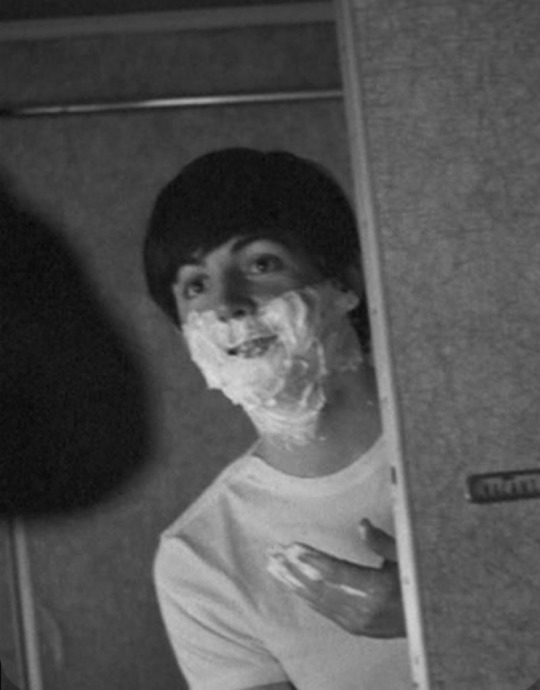
born on june 18, 1942
if you ever have spare time just check out this man’s natal chart.
idk how he’s still alive with his chart tbh.
he has a younger brother named mike and a step sister named ruth.
his dad thought he was the ugliest baby he’d ever seen when he was born.
when he was young paul would kill frogs in a way to prepare himself for the war if he ever was drafted.
the first instrument he ever learned to play was the trumpet.
I don't even want to list every instrument this man can play but trust me when I say it’s a lot.
but for the beatles he mainly did bass, vocals, and piano. sometimes playing the guitar and the drums.
the beatles was just paul moving really, really fast.
he lost his mother when he was 14 due to surgery for breast cancer.
never really learned how to cope well with loss of a loved one tbh.
had the cutest chubby cheeks as a kid tbh
met john and was accepted into his band
sometimes they'd ditch school together and either work on music or would visit art galleries.
went to paris with john and john bought him all the banana milkshakes that he wanted.
connected over their love and admiration for music, and bc they had both lost their mothers.
had a girlfriend’s mom who he would make comb his leg hairs.
was an ass to his first girlfriend.
kill all men again.
almost had to marry his girlfriend dot bc she was pregnant, but she ended up losing the baby.
was the one who introduced george harrison to john.
practically despised pete best and stuart stutcliffe bc they were bringing the group down.
got arrested along with pete best bc they lit a condom on fire in hamburg.
still felt awful and a little guilty when stuart died suddenly.
main force behind the beatles imo.
without him we’d have not as much beatles music as we do.
was dating jane asher throughout majority of the sixties.
when they first met they talked about syrup and paul fell in love.
they broke things off after she walked in on him sleeping with another woman though.
directed magical mystery tour and it was amazing and I don't care what anyone says ok?
when john divorced cynthia he was the only one not scared of john and went against his wishes of not speaking to cynthia.
was a little controlling at times.
has a good heart though.
mal evans had to drive him home once after a beatles sessions bc he was crying so hard.
was talking about getting the band back to touring when john said he was leaving the group.
everyone kind of turned against him when the beatles were breaking up and i hate it.
he just wanted what was best for the band.
married linda and had a nice little farm.
we love that story.
linda i'm free thursday if you want to hang out pls.
started up the whole “no meat monday” thing where you don't eat monday on mondays
food meat. not the other kind of meat.
children: james mccartney, stella mccartney, heather mccartney, mary mccartney, and beatrice mccartney.
rip martha.
WINGS!!
he lost linda in 1998 due to cancer.
cried for a whole year bc of it.
still has dreams about john and says they're nice.
wrote a sad song about john called “here today.”
really loved john. like..he truly, genuinely did.
want someone to love me like paul does john.
“think of me every now and then old friend.”
honorable paul moments:
his story about george’s dad
“john? he was beautiful. very beautiful.”
humpty dumpty rap
another story about him and george.
his google search video that I watch every week
this
george harrison
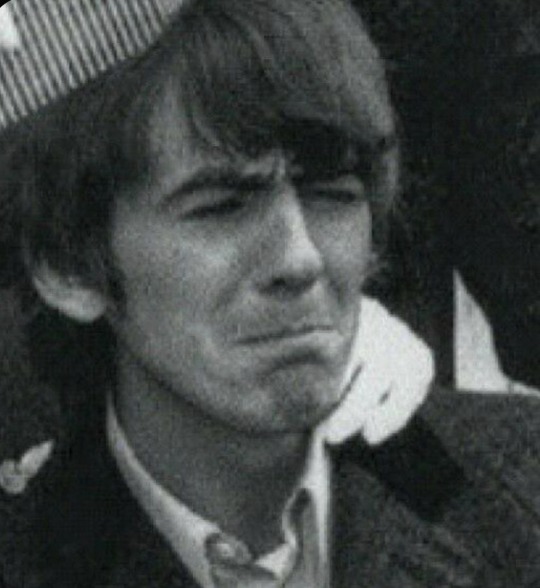
born: February 24, 1943
or at least we think
bc he use to say that his birthday was february 25, but later started saying it february 24.
why can't we change our birthdays its not like we picked it
he was the youngest child.
baby of the family and of the beatles awwww
two older brothers named harry and peter. one older sister named louise.
when george’s mom was pregnant with him she’d play sitar music.
his mom was super supportive of his career choice
when he was 16 he worked as an electricians apprentice.
his dad kind of hoped he would start a family business out of it.
george said nah
would ride the bus opposite way of his house just to spend time with paul
headbutted a kid bc he didn't think they were worthy of paul’s friendship
was brought into the band bc of paul insisting to john
would follow john around like a lost puppy when he first met him
once had an eight hour erection. don't ask me how idk he said it.
was 17 when he lost his virginity and the other band members were in the room watching and cheered him when he finished
most sex craved beatle tbh
once walked into a girls dressing room and asked if they could stand there so he could masturbate
he was the first beatle to go to america
got a black eye for defending ringo once
would make john and paul take turns sharing rooms with ringo when he first joined the band so that he felt more welcomed
when ringo left during the white album and then came back george decorated the studio with flowers for him
during the beatles first recording session he told george martin that he didn't like his tie
became a vegetarian at 22
favorite candy was jelly beans and purple was his favorite color
used the phrase “grotty” in the hard days night movie, hated it, but everyone else picked up on the slang
met his first wife, pattie boyd, on the set of a hard days night
was turned down by her at first
they married in 1966
wouldn't let her do modeling stuff and was kind of an ass
a stylish couple but not the best image for a healthy relationship
got into eastern religion around 1965
during the Hamburg days he would eat chicken on stage
had an affair with ringo’s first wife maureen
got a divorce from pattie in 1977
in 1978 he married olivia who he stayed with until his death and had one son with. dhani.
was the first beatle to hit a number one single and album.
was buddies with led zeppelin
inspired their “rain song”
smashed a piece of cake on john bonham’s head and then was thrown into the pool by him
he financed and produced films. had a production company.
tom petty said that george never shut up once you started talking to him
but he was often referred to as “the quiet beatle”
formed another band called the traveling wilburys
he’d answer questions online in the 2000′s and it’s the cutest thing ever and his answers break my heart too.
“what do you miss most about john lennon?” “john lennon.”
in 1999 a schizophrenic person broke into his house and stabbed him 40 times
thank god olivia was there bc she was the only braincell in the room
had to get a part of his lung taken out
died november 29, 2001 from lung cancer
ashes were scattered into the ganges river
honorable george moments:
this interview he did with ringo
“i'm sad bc i can't play guitars with john anymore. but i did that...i know we’ll meet again some day.”
when he invented reaction videos
“the wind was blowing.” “..blowing my girl?”
“what kind of girl do you like?” “john’s wife.”
sir richard starkey aka ringo starr
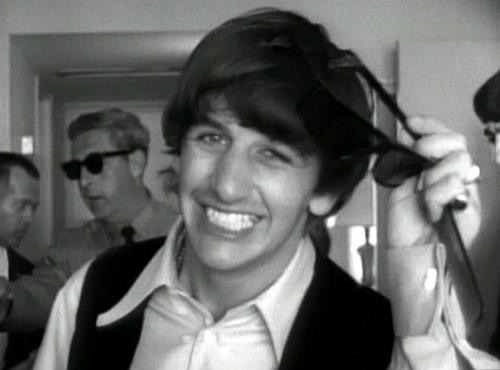
born on july 7, 1940
oldest member in the group
has no siblings
naturally was left handed but his grandma thought it was bad luck so he writes right handed, and plays drums with a right handed kit
but does everything else left handed
when he was 6 he fell into a two month coma
was a very sick child
when he was 13 he was in the hosiptal for tuberculosis and formed a hospital band
grew up poor
loves and looked up to his stepfather a lot
his step father bought him his first drum kit in 1957
wasn't that great in school bc he missed so much of it from being so sick
he worked for a britain railway for a while
also served drinks on a day boat for a job
loves dancing
Rory storm and the hurricanes
got his nickname from all the rings he would wear
replaced pete best as the beatles drummer
dealt with people hating him for a bit bc they liked pete more
had to style his hair in a bowl cut to be in the band and i'm still mad at them for making him do that shit
ringo i'm so sorry
george martin didn't really like his drumming and had a session drummer come in for the first album
in 1964 he had tonsillitis, pharyngitis, and high fever all at once and had to be in the hospital for a bit.
was worried the beatles would replace him for good
he’s a cancer don't worry
was the first beatle to try weed
drummers always go first huh
married his first wife, maureen, in 1965
she kissed paul, ringo, and george.
what a champ
honeymoon was ruined by reporters
was really insecure in his relationship and needed a lot of reassurance
had a great relationship with pretty much all the beatles
but a great one with john
john felt his most relaxed when he was with ringo
was once in a movie with roger daltrey
divorced maureen in 1975
his wife now is barbara bach who he married in 1981
had alcohol problems
once gotten so drunk that he beat barbara so badly that he thought he killed her
put himself into rehab after that
barbara lowkey looks like jan from the office
children: zak, lee, and jason
zak is the drummer for the band the who
peace and love
but don't send me fan mail anymore
peace and love
ringo starr and the allstar band (starting 1981)
was the narrator for thomas the tank engine
will play at paul’s concerts sometimes now for fun
mad bc he came on stage during paul’s last concert show and it was on my birthday and I couldn't go to it
honorable ringo moments:
“do you want me to come with you?”
stupid barbara walters
talking about paul
giving us a little dance
#hopefully this one is more better#took forever omfg#and its still not great#mad at myself#oh well#enjoy nothing#the beatles#the#beatles#the beatles moments#the beatles posts#John lennon#John#lennon#paul mccartney#paul#mccartney#ringo starr#ringo#starr#george harrison#george#harrison
499 notes
·
View notes
Text
Why “The Goldfinch” by Donna Tartt is Gay.
(Or: Why Theo is dealing with some fucking heavy internalised homophobia - that man is not straight lemme tell you that off the bat)
John Crowley and Cliffsnotes pissed me off when they said The Goldfinch wasn’t gay so I wrote a fucking long ass essay on Theo’s internalised homophobia...and I got carried away and it’s around 4,500 words so...have a read if you like!
+ I read some Goldfinch essays/analysis on here before and really enjoyed them so I thought I’d have a go!!
Be warned - it is absolute trash, I wrote it at 2am.
For context: I’m a big lesbian and have/still am dealing with internalised homophobia - so I know the motherfucker when I see it! Don’t test me, bitches!
I’m assuming we all know what internalised homophobia is so we’ll jump straight in.
The Cases of Internalised Homophobia Throughout the Novel
• Throughout the novel, Theo is subject to his own internalised homophobia and whilst it could be considered as fairly difficult to spot, it is, nonetheless, there.
• The way internalised homophobia is depicted is often in very short, brushed-over extracts which are presented sparsely throughout the entirety of the novel - this in itself is an example of internalised homophobia. Theo brushing-over any topic that is remotely gay, essentially avoiding the subject, in order to remove any link to the possibilities of homosexuality (leading towards Theo himself and the rest of the world in general) is a clear depiction of a fear to be associated or even draw near the subject that is The Gays(TM).
• This is different to straight (HA!) up homophobia as Theo is not homophobic to anyone other than himself, even though internalised homophobia can lead to homophobic behaviour towards others as well as oneself.
Theo’s Acceptance of Homosexuality - Not Regarding Himself.
Throughout the novel we broach the subject of homosexuality many a time, and the only times Theo becomes uncomfortable with dealing with it, is when it regards him. He presents a clear need to withdraw from any behaviour that could contribute towards “being gay” (as shown in Chapter 5 - Badr al-Dine: “I was going to miss them, but it seemed gay to come out and say so”) that could be seen by the outside world and does react extremely, in some cases, when confronted with having to deal with his sexuality. Otherwise, he is accepting.
(He is accepting of others but he does have a general sense of discomfort when regarding The Gays(TM) incase suspicion lays on him - this is another example of internalised homophobia, he is constantly paranoid whenever the subject is broached. Paranoid of what is not exactly clear, but then again internalised homophobia is not fuelled with logic, it is fuelled with fear, which can be the most illogical feeling to deal with).
A significant example of Theo accepting the idea of homosexuality, as long as it remains abstract and far away from him, is:
Hobie, and Theo’s relationship to him:
Theo accepts the idea that Hobie and Welty (Hobie’s “business partner”) raised Pippa together and whilst Hobie and Welty’s relationship is never explicitly depicted, we are aware of its status as a romantic relationship - Hobie and Welty lived and raised Pippa, Welty’s niece, together and Pippa also refers to Hobie as her uncle (Chapter 4 - Morphine Lollypop: “Hobie can’t do anything - he isn’t my real uncle. My pretend uncle, [her Aunt Margaret] calls him”.
Theo becomes uncomfortable when the idea is suggested to him by Boris that Hobie could be gay. (However, he eventually comes around to the idea and not caring once he ends up living with Hobie after his father dies.)
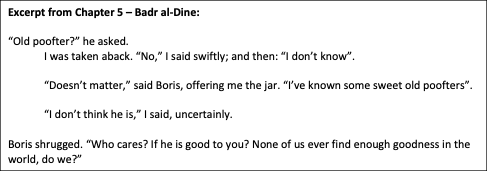
Theo’s discomfort here clearly depicts his own internalised homophobia. This is illustrated by the language he uses to describe his reactions and personal responses to the revelation as well as his responses to Boris.
Theo describing feeling “taken aback” suggests his sudden fear at homosexuality being bought up between him and Boris. This illustrates his need to get away from the topic as quick as possible, which is reinforced by the use of the adverb “swiftly”. Theo wants to “swiftly” move on from the subject regarding Hobie’s sexuality as it could, in some roundabout way that is made logical by internalised homophobia, be related to him and paint him as being gay. He then claims “I don’t know” as the swift “No” could have also implied him and Hobie could have had a conversation regarding sexuality before which also could “incriminate” him. After Boris’ response, which depicts his acceptance of homosexuality, Theo is firm in the idea of Hobie not being gay as for Hobie to be gay would be a “bad” thing in the heteronormative society we live in. The use of the adverb “uncertainly” reinforces the idea that Theo does not want Boris to perceive him or people he affiliates with as gay, despite Boris’ accepting response.

The fact Theo begins to ignore Hobie because of “Boris’ casual speculation” is another example of his internalised homophobia. Another example is also the fact the he “felt bad; [he] felt awful” – this shows how he knows that ignoring Hobie is the wrong thing to be doing, but he can’t help it because he is riddled with the feeling of fear – he can’t possibly be associated with someone else gay, he’s not sure as to why this is, but to the reader, it is clear that it is because it could paint him as being gay by association.
*Theo also accepts homosexuality in passing too, when he doesn’t have to think about it too much, e.g: “(know-it-all decorator? New Jersey housewife? self-conscious gay man?)” – C. 9, “while you were all in there, two guys, we thought we were in the shit but was only two gays, French guys, looking for restaurant—” – Gyuri, Boris’ driver, mentions this and Theo does not respond or have an internal monologue about The Gays™, it completely flies over his internalised homophobic head as he is shell-shocked from having The Goldfinch back showing that as long as it remains in the abstract and away from him, he does not care.
Theo’s relationship with homosexuality when it regards himself:
Theo does not like to be linked with anything that could possibly paint him as gay. This is a form/manifestation of internalised homophobia as this depicts behaviour that believes to be gay is “other”, not “the norm”, and a bad thing to be in our heteronormative society.

He is worried that people will perceive him as gay or lesser for having Popper with him (I think he’s a Maltese or something).
He wishes he had a dog that was more “masculine” – (less “gay”).
The fact that he says he “felt embarrassed to walk on the street” with his “completely gay” dog is another example of internalised homophobia – wanting to move away from anything that can remotely constitute to him being part of something “other” than the “norm”.
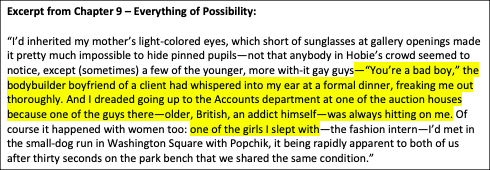
The language Theo uses to describe men flirting with him is extreme to say the least. He says that men flirting with him was “freaking [him] out thoroughly” and that he “dreaded” the “older, British” guy “always hitting on [him]”. Now, this could be perceived as just plain old homophobia, however, due to its extreme nature, it led me to believe that it is internalised. The adverb “thoroughly” depicts how disturbed Theo is by being hit on by this guy. This subsequently shows that the sense of discomfort he feels comes from a place of fear. He doesn’t want to have to respond to this guy as that would be acknowledging homosexuality regarding himself and linking himself to homosexuality.
One of the ways he justifies himself and his (none existent lmao) heterosexuality is by attempting to remove a link between himself and homosexuality. He does this by reinforcing the fact that he was slept with women in the sentence right after. He reminds the audience at the first possible instance that he can, that he is in fact not gay and sleeps with women (e.g: “one of the girls I slept with”)s
Theo’s Romantic Relationships with Women and How They Depict a Lack of Enthusiasm:
Kitsey
Theo’s descriptions of her in the book remain cold. He never seems to truly love her. We only really ever see Kitsey in cool coloured clothing (Ah! In the sky-blue?” – Theo and Kitsey’s engagement party, Chapter 10 – The Idiot), even Boris refers to her as “a bit icy to look at, no?...She – she is a lily, a snowflake! Less frosty in private, I hope?” (Chapter 10 – The Idiot).
The semantic field created by the use of “icy” and “frosty” from Boris, an outsider to Theo and Kitsey’s relationship, manages to clearly demonstrate to the audience, or anyone really looking at their relationship, that is a passionless one.
The significance of Boris referring to Kitsey as a “lily”, the traditional flower symbolic with death, is astounding as it reinforces that Theo and Kitsey’s relationship is passionless, cold, and dead.
Additionally: “Boris laughed. “And you love her, yes. But not too much.” / “Why do you say that?” / “Because you are not mad, or wild, or grieving!” (Chapter 10 – The Idiot).
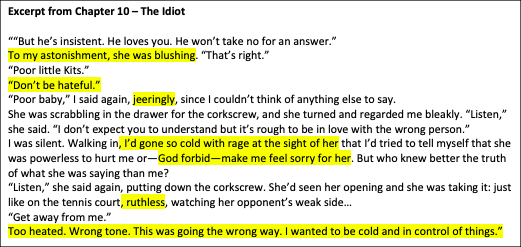
“To my astonishment, she was blushing” – Kitsey is depicted as reserved emotionally by Theo throughout the novel, this contributes to his perception of her as “cold”. His “astonishment” here is at the fact that 1) She is showing emotion, an emotion that is linked to a considerable amount of vulnerability, and 2) The act of “blushing” is also linked to heat and warmth, which, Kitsey, apparently, is not.
“ruthless” – Theo also tries to portray Kitsey as “ruthless” despite the fact that in this scene, he is the crueller, colder party.
There is also another semantic field of coldness here, but this time it is Theo who wants to remain cold to Kitsey. This is symbolic of his passionless feelings for her and their relationship, removing himself from any sort of intimacy with her.
Pippa
Theo believes that he is in love with Pippa and whilst he definitely does love her platonically, he is not in love with her. He is obsessed with her. He is obsessed with Pippa in the same way he is to The Goldfinch – it’s one of the only things he has left that is able to link him to his mother, it’s one of the only things he has that can comfort him like his mother could. In short, it is something he feels vulnerable around due to it’s connection to the museum bombing, as well as his mother’s own fondness and bond with the painting. Pippa is to him as The Goldfinch was to his mother – a piece of artwork with astounding beauty. Pippa is merely something that he feels connected to, because of his mother – hence why he holds onto Pippa, as well as The Goldfinch, so tightly.
He does not love Pippa, he commodifies her. He describes her to the reader as he does The Goldfinch – (I mean the parts where he’s like UWU Her Limp! UWU Her Hair! UWU I’m Taking Her Hair Out Of The Trash! But alas, I couldn’t find them, forgive me). His love for her is obsession and Theo is even, minutely, aware of this himself.
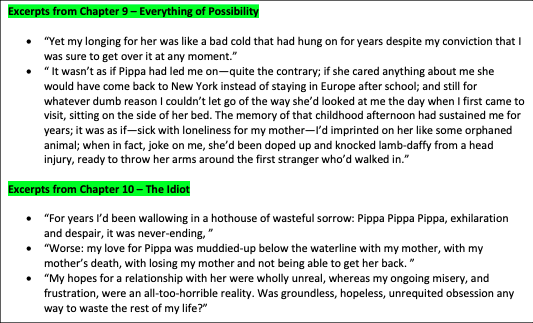
He also feels a bond with Pippa, which is reciprocated by her, as they both lost their parental figure the day of the bombing. They were both left devastated by the loss of their parental figure – only their grief manifested in different ways. (For Pippa hers way through the physical injuries she received and having to spend time at the school for “troubled” girls in Switzerland, whereas Theo’s grief is shown through him not eating and sleeping whilst at the Barbour’s and then his drug and alcohol abuse in Vegas with Boris)
The great love he feels and shares with Pippa is clearly platonic however, he could be mistaking this love they have for romantic as a result of compulsory heterosexuality – (I’m using compulsory heterosexuality in this case as an LGBTQ+ individual feeling that they have to have romantic feelings/relations to people of the opposite gender/sex, and subconsciously forcing themselves to do so - due to the heteronormative society we live in) – but idk I’d have to look into that more.
Manifestations of Internalised Homophobia in Theo’s Behaviour/Lifestyle:
Denial/failure to acknowledge The Gay™ - see Vegas Boris relationship,
Attempts to pass as het/marrying for social approval – see marrying Kitsey, not loving her, marrying her for social approval from the Barbour’s (Mrs Barbour happy),
*Dropping out of school – see Vegas era – no work, on drugs and drunk at school, NY – works to get into early college program but doesn’t excel once he’s there, doesn’t try, takes 6 years to finish,
*Self-monitoring – the pills addiction, e.g: bit at the end where he obsessively monitors the amounts of shit he takes, his obsession with what he wears/how he appears socially,
*Substance Abuse babey! – see, the entire fucking novel,
*Suicide attempts babey! – see the end of the novel (Amsterdam) + after Amsterdam when he reveals that he’s tried before.
(All the bullets with a * I think have other reasons contributing to why Theo has those behaviours – I don’t think they’re solely because of internalised homophobia, e.g: substance abuse – a way of him going through his grief for his mother that he never really gets over because it’s a shit coping mechanism tbh)
Theo and Boris’ Relationship:
I think Theo and Boris’ relationship is the best example in “The Goldfinch” of Theo’s internalised homophobia as it covers an entire ass range of shit. For example:
Theo’s descriptions of Boris – This motherfucker goes on and fucking on about the way Boris looks like, bro we get it – he’s cute. Does he do this for literally anyone else in the novel? No (apart from his mother really but that’s on obsession not homo) – I would provide quotes, but quite frankly, this essay has gone on way longer than I anticipated and I cannot be bothered because there’s far too many for me to find.
The Moon Metaphor:

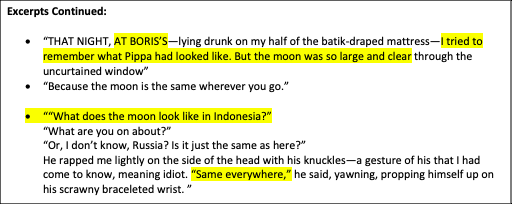
The moon represents home for Theo due to the story his mother told him. Boris is intrinsically linked to the moon. Theo couldn’t think about Pippa because “the moon was so large and clear”, cased closed.
How much Theo hates Kotku for no reason – and that’s on jealousy!
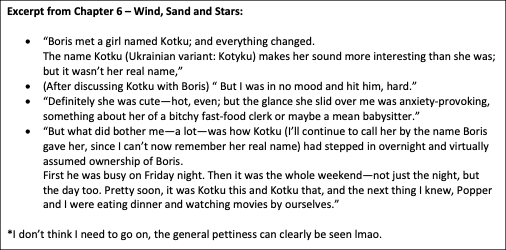
Theo and Boris literally fucking – Theo can only deal with this when he’s drunk (as that’s when they did it??). We also know that it actually meant something to him due to his incessant fucking assurance to us that it didn’t mean anything.
Like the entire few pages the excerpt below comes from, you know the ones:

The last time he sees Boris in Vegas – The entire “which was, of course, I love you” spiel he gives - change my mind, that is the gayest shit I’ve ever fucking read.
This entire fucking part:

Boris is trying to lighten the mood since Theo’s freaking the fuck out about losing The Goldfinch. When he realised Theo’s freaked out by The Gay™ (“No, no!” he said quickly, shaking his head, when he saw the look on my face”) he tries to comfort him because he knows Theo’s freaking the fuck out and that does not help the current situation (“I think it happens at that age sometimes”).
Theo is fucking really disturbed by the fact he’s being confronted with The Gay Shit™ he did in his youth (“My laugh spluttered out angrily, as if I’d coughed or choked on something”) and that’s on internalised homophobia.
+ You know that part somewhere in Chapter 10 where they’re in a diner or something Boris says something like “girlfriend or boyfriend” and Theo like literally gets up to leave? HAHA? What’s that about? – I couldn’t find it so sorry about that lol but here you go anyways.
In conclusion: it’s gay.
+ All that analysis is great, but why does this happen? Why does he experience this internalised homophobia?
In short, idk, it’s a question I’ve asked myself when suffering the same thing and thing only reason I can think as to why internalised homophobia is experienced - when you’re not part of a religion that says no (apparently) or an inherently homophobic environment - is simply because society is heteronormative. Because of this, you don’t see yourself represented in media or in the world (especially if you don’t know of/meet LGBTQ+ relatives/friends/role models when your young – or at all for that matter). It becomes really hard to see yourself in the world and whenever you do it feels really alien? It feels either like the greatest gift you’ve ever fucking had or a strange, unsettling event that you weren’t prepared for. Because there’s so little representation it feels like a fucking revelation whenever it is there – it’s a reminder that you are allowed to be a person, you have a place in this world as an LGBTQ+ person, you are right – you are not wrong or a fuck up, y’know? But then, it’s gone again too soon and you still feel not quite right?
TLDR – Theo (most likely) experiences internalised homophobia because of society being icky and also because I said so.
#the goldfinch#theo decker#boris pavlikovsky#hyperfixation whom? idk her!#i love how i've done this instead of work towards my actual english quallification#i'm so sorry if you've read all that#a gold star for whomever managed to read this monstrosity
77 notes
·
View notes
Photo

Pride: 25 Queer Films To Love.
Dating Amber writer and director David Freyne introduces our London correspondent Ella Kemp to 25 of his favorite LGBTQIA films.
A coming-out, coming-of-age film, David Freyne’s Dating Amber follows “baby gays” Eddie (Fionn O’Shea) and Amber (Lola Petticrew), who act as each other’s beards in order to stop speculation about their sexualities. Released on Amazon Prime Video in the UK for Pride month, it’s winning praise from Letterboxd members as a “charming” and “gentle” comedy-drama “full of loveliness that extends beyond the Irish accents”.
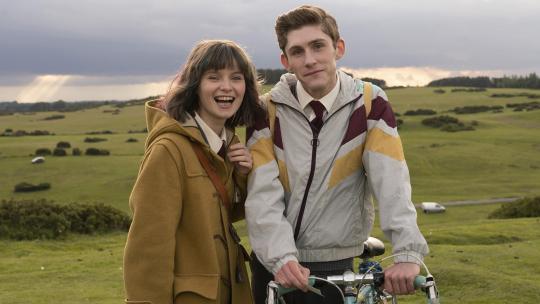
Lola Petticrew and Fionn O’Shea as Amber and Eddie in ‘Dating Amber’.
As the number of films by and about the gay and trans community expands, we asked Freyne if he could narrow down a list of ten favorites for us. The answer was no—instead, we got 25!
“There are so many extraordinary queer films beyond this list, but all of these films just really affected me when I saw them. Some were the first time I saw queerness on screen, while I deeply identified with others. And, as a filmmaker, each of them makes me braver to fight to tell stories that aren't always easy to get made.
“They are in no particular order because I don’t want to bump into Barry Jenkins (which is obviously going to happen) and have to explain that he is number five on that list (that he will definitely read) for no specific reason. It’s just a technicality.”
David Freyne’s 25 Favorite LGBTQIA+ Films
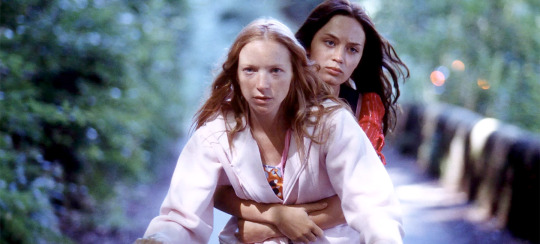
My Summer of Love (2004) Directed by Paweł Pawlikowski
Paweł Pawlikowski’s film feels like a dream that sweeps you up along with it, helped along by incredible early performances from Natalie Press and Emily Blunt. The hypnotic use of Goldfrapp's ‘Lovely Head’ is probably my favorite use of a song in any film ever. Their drug-fuelled dancing was a massive inspiration for Eddie and Amber’s baby steps into Dublin’s gay scene in Dating Amber.
Weekend (2011) Directed by Andrew Haigh
I never fail to cry buckets at the end of this heartbreaking gem. It’s small in the best sense of the word. Two people fall in love over one intimate weekend. Their gayness is both incidental and totally fundamental. It’s so delicate and moving. Andrew Haigh is a master.
But I’m a Cheerleader (1999) Directed by Jamie Babbit
Jamie Babbit’s debut is a brilliant, campy comedy about a cheerleader sent to a conversion therapy camp. I love it for all the reasons many critics (at the time) disliked it. It is subversive, quirky and defiantly upbeat. And it stars Natasha Lyonne and Clea Duvall. Enough said.
Paris is Burning (1990) Directed by Jennie Livingston
I’m not saying anything new when I say that Paris is Burning is necessary viewing. It’s a hilarious, moving and eye-opening look at the (mostly) Black trans women in New York’s ball scene. It is a glimpse into the lives of these extraordinary people who risked everything to live authentically, for themselves and each other. And at a time when our trans family is so under attack, it is vital to see such iconic figures from our community. You’ve probably seen it. Re-watch it. Also those end notes will make you cry.
Happy Together (1997) Directed by Wong Kar-wai
As with all Wong Kar-wai’s work, it is jaw-droppingly gorgeous. It’s a tough watch, a portrait of a toxic, failing relationship. But it looks beautiful. They’re miserable and co-dependent. It’s abusive and awful. But it’s great. It really is a great film. I’m not selling this one well. Just watch it.
Moonlight (2016) Directed by Barry Jenkins
Definitely worth watching after Happy Together. Not just because it will make you feel better, but because Barry Jenkins has noted it as a big influence. Also, Moonlight is a masterpiece. You know that, of course. Side note: I realize I’ll never be able to create a hand-job scene as powerful and tender as Jenkins did here, but, in Dating Amber, I made three comedy hand-jobs. Take that Jenkins!

God’s Own Country (2017) Directed by Francis Lee
You can feel Francis Lee in every frame of this film. It’s personal filmmaking at its very best, with wonderful performances from Josh O’Connor and Alec Secăreanu. And it has the most beautifully romantic ending that you only realize we lack for LGBTQ characters when you see it laid out so wonderfully. When we were trying to finance Dating Amber and people suggested it was too Irish, I’d just reference God’s Own Country, which is so defiantly Yorkshire, and they’d shut up. Also, Secăreanu’s jumper with a thumb hole is my style icon. Bring on Ammonite!
Can You Ever Forgive Me? (2018) Directed by Marielle Heller
Marielle Heller is such a brilliant filmmaker. This film is based on the memoir by Lee Israel who forged letters by famous people to sell. It’s a genre piece that feels like it could have been made in the 70s. But what I love about it the most is that it is a rare example of a film that centers the friendship between a lesbian and a gay man. Why do films usually treat us like we exist in totally separate worlds? Anyway, it’s a joyous watch.
Tangerine (2015) Directed by Sean Baker
I’m obsessed with tightly plotted films and Tangerine doesn’t waste a frame. It’s 88 minutes of pure wit, charm and entertainment in line with the best of old-school Hollywood. You instantly forget that Baker’s film is shot on an iPhone and just get swept up in the extraordinary performances of Mya Taylor and Kitana Kiki Rodriguez. It’s such a mystery they don’t work more. (Reader: it’s not a mystery. It’s because they are Black trans women, and the industry is shit.)

Portrait of a Lady On Fire (2019) Directed by Céline Sciamma
We all bow at the alter of Céline Sciamma. This film is perfection. The sparse-but-powerful use of music, exquisite photography and extraordinary performances that burn beneath the stillness. The final shots of Adèle Haenel will feed your soul for a year. (Side note: face masks have never looked so stylish.)
Sunday Bloody Sunday (1971) Directed by John Schlesinger
This was John Schlesinger’s follow up to his best-known film, Midnight Cowboy. A middle-aged gay doctor (Peter Finch), and a divorced woman (Glenda Jackson), are both in an open love triangle with a younger, bisexual sculptor (Murray Head). It’s quite low-key and far tamer now than when it was released, but it’s a beautiful film and Schlesinger’s most personal. He was one of the few openly gay directors of his time. And Jackson’s performance steals it.
Far From Heaven (2002) Directed by Todd Haynes
Todd Haynes’ stunning film will make you immediately go out and discover all of Douglas Sirk’s glorious technicolor melodramas. Julianne Moore’s performance as a wife who discovers her husband is gay will break you. Dennis Quaid is also terrific as her closeted husband.
The Watermelon Woman (1996) Directed by Cheryl Dunye
Cheryl Dunye’s low-budget debut is a seminal queer film. A video store worker and documentarian (played by Dunye) starts a new relationship while becoming obsessed with ‘the watermelon woman’, a Black actress forgotten by history. It’s lo-fi, funny and a, far too rare, film about race and sexuality.
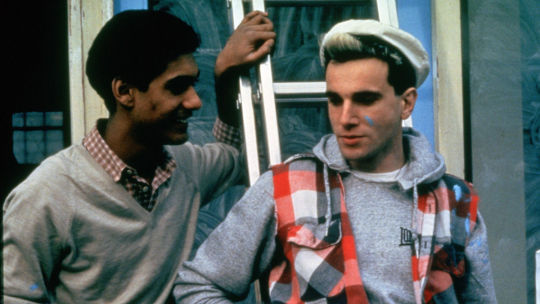
My Beautiful Laundrette (1985) Directed by Stephen Frears
It may have been the first time I saw gay characters on screen and, at the time, it petrified me. But what an amazing film about love, acceptance and the power to change. Fun fact: Daniel Day-Lewis spent a year as a tumble dryer in preparation for his role.
Beautiful Thing (1996) Directed by Hettie MacDonald
Hettie MacDonald’s coming-of-age film is so lovely, honest and tender. James Harvey adapted it from his own play of the same name. The soundtrack is almost entirely The Mamas and the Papas. I am surprised some cigar-smoking West-End mogul hasn’t attempted a musical adaptation. Or maybe they have, I don’t know.
Pride (2014) Directed by Matthew Warchus
Such a purely entertaining film while being urgent, political and deeply moving. Beresford’s script is a masterclass in plotting and if you don’t cry at the end then you are dead inside. Sorry but that’s just science. Also it has the most emotional postscript coda since, well, Paris is Burning.
Love is Strange (2014) Directed by Ira Sachs
Ira Sachs is one of my favorite current filmmakers and criminally underrated. I mean, he’s appreciated, but he needs to be lauded. Love is Strange is such a charming and quietly devastating love story about an older gay couple who lose their apartment and have to couch surf with relatives. It’s one of the most effective films in dealing with the rental crisis in big cities, something he does equally brilliantly in the follow-up, Little Men.
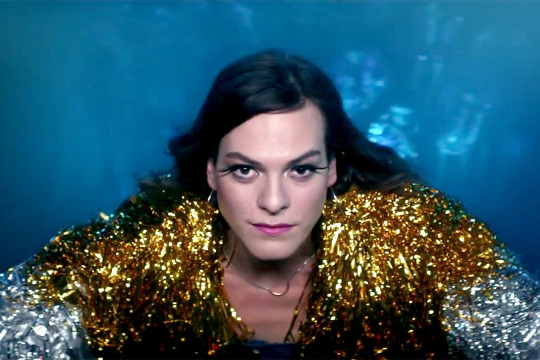
A Fantastic Woman (2017) Directed by Sebastián Lelio
Sebastián Lelio’s film is a beautiful story about one trans woman’s grief after the unexpected death of her older partner. But what makes this film so spectacular is the captivating performance by Daniela Vega. We need to see more of her on screen.
BPM (Beats per Minute) (2017) Directed by Robin Campillo
It’s a film about the AIDS activism of Act Up in 1990s Paris. What makes this so incredible is how joyous it is. Strobe-doused dance scenes punctuate this film that will make you want to take to the streets and fight for your rights.
The Queen of Ireland (2015) Directed by Conor Horgan
This documentary by Conor Horgan follows Ireland’s most famous drag queen, Panti Bliss (aka Rory O’Neill). It’s about his life, a legal battle (a bunch of homophobes sued Rory for calling them homophobes on national TV) and the staging of a show in his hometown. Central to all this is Ireland’s historic vote on marriage equality, something that Panti was a powerful figure in. If you want to laugh and have your heart soar in seeing confirmation of how a once painfully conservative country moved to love and equality, watch this.
The Kids Are All Right (2010) Directed by Lisa Cholodenko
Lisa Cholodenko’s feature is a warm, witty and realistic look at a lesbian couple and their children. Every performance is pitch perfect. I can’t believe it’s a decade old and that we have had so few similar films since.
Booksmart (2019) Directed by Olivia Wilde
We need more joyous films with queer leads and Olivia Wilde’s debut is just that. Set over one night of belated partying, we follow best friends Molly and Amy (Beanie Feldstein and Kaitlyn Dever), one of whom happens to be a lesbian. It is just so much fun to watch.
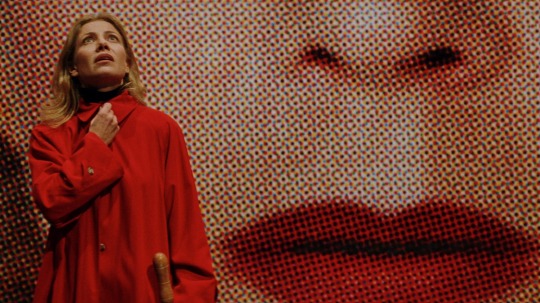
All About My Mother (1999) Directed by Pedro Almodóvar
I mean this list could just be an Almodóvar filmography, but All About My Mother just happened to be the first of his I saw and it blew my little gay mind. It’s simply about love in its truest sense. Almodóvar said it best with his dedication, “To all actresses who have played actresses. To all women who act. To men who act and become women. To all the people who want to be mothers. To my mother.”
Female Trouble (1974) Directed by John Waters
You can’t have a queer film list without John Waters, and this 1974 classic is my favorite of his. It follows Dawn Davenport (played by the legendary Divine) from teen delinquent to the electric chair. It’s hilarious, irreverent and distasteful in the ways only Waters can be.
Saint Maud (2019) Directed by Rose Glass
Rose Glass’s debut film isn’t out yet and so technically shouldn’t be on the list. But I saw at a festival last year and loved it, so there. It’s a horror film about a private nurse (rising star Morfydd Clark) who tries to save the soul of her deviant and lesbian patient (the always-brilliant Jennifer Ehle). It’s eerie, stylish and the sort of debut all us filmmakers wish we had. Shut up, you’re jealous!
Related content
MundoF’s Opening the Vault: a chronological history of queer interest and LGBTQ+ cinema.
Leonora’s list of Films by Transgender Writers and Directors.
Out of the Closets and Into the Cinemas!: meeting queer folks in dark rooms.
New Queer Cinema
Queer Films Everyone Must See
Queer, Black, 21st Century: A Pride 2020 List
Autostraddle’s Top 200 Lesbian, Bisexual & Queer Movies of All Time
Brianna’s list of LGBT+ Animation
#david freyne#dating amber#irish film#queer film#gay director#gay cinema#queer cinema#gay pride#pride month#lgbt#lgbtqia#trans film#trans filmmaker#john waters#todd haynes#paris is burning#jamie babbit#pedro almodovar#pawel pawlikowski#celine sciamma#sean baker#lisa cholodenko#wong kar-wai#francis lee#booksmart#letterboxd
61 notes
·
View notes
Text
Day 41: Caliborn: Enter
https://homestuck.com/story/4956 It’s pretty natural that Dirk’s move on Jake is going to put a strain on Jane’s friendship with him, even if he hasn’t made it yet; I think it definitely gives some insight into Jane that she reacts the way that she does. Not exactly a graceful loser, and in a way that is really pretty passive-aggressive.
She’s not as open and honest as Jade is; as the Prospit Dreamers go, in general, she’s really pretty guarded.
More after the Break
https://homestuck.com/story/4961
The AR, I feel like, gives us a pretty good look into who Dirk is, and while we already know that he impulsively jumps to the first solution he can think of, we can see through the shades that he tends to advise people to do the same things that he does.
Dirk is an extremely headstrong guy, and while he’s both very intelligent, and would really like to be a Puppetmaster, he can’t help but let his personality shine through his puppets; and he can’t help but let his first inclination determine his course of action. He’s him, after all. Why would he question his own judgement?
A bit like how Kermit the Frog is really just Jim Henson the Frog.
https://homestuck.com/story/4962
So what is a Juju?
Juju is a word which comes from French, and means plaything. It is a term that has been used to characterize the Folk Magic and/or Folk Religion of the people of West Africa, in much the same way that Totem has been, or that Fetish has been. In a nutshell, Juju can mean both Spiritual Power (as Mana), and an Object of Spiritual Power (as an Amulet) - the physical manifestation of the thing, and the thing itself are the same, in this sense.
The God and the Idol are the same - at least, they are to the external viewer. While it should be clear that this is a reductive view of it, the fact of the matter is that, a central part of a lot of religious practice in general is to treat the image of a thing, and the thing itself, as though they are the same; and we see this sort of image-based performance all throughout homestuck, through symbols, and rituals, especially where they are empty signifiers - symbols and rituals that have been emptied of their original meaning, and are now practiced only for their own sake.
Following the rules actually doesn’t seem to pay all that much in the world of Homestuck, and almost universally leads to disaster - which in no small part appears to be because the creator of the rules is Lord English.
https://homestuck.com/story/4965
I think it’s pretty interesting that Caliborn’s conception of smut is something as tame as fluffy hand-holding and caressing. While on the one hand, we can just say “Cherubs think it’s taboo because they can only enjoy Caliginous romance” I think we can also associate it with the relatively sexless nature of Homestuck, beyond how horny the characters are, and a few oblique references (which is not a bad thing; it’s about teenagers). In spite of all of the suggestive language and content, there is no possibility of consummation in Homestuck, or even until well after the end of Homestuck, because Caliborn’s vision of intimacy is a sexless one.
https://homestuck.com/story/4967
This takes a turn for the fucked up at the end. I mean, it’s all fucked up to begin with, but it’s such a non-sequitur.
https://homestuck.com/story/4968
Caliborn uses consumption related metaphors and imagery in relation to smut. Aside from jokes about Vore, what’s the significance of that? That the intention of Caliborn and Calliope is to comment on the fandom of Homestuck itself (continuing the identification of the Characters with the Audience that we discussed yesterday) is not really a secret to anyone. How does Caliborn view engaging with Homestuck, and how does he therefore view engaging with Andrew? His view is Hegemonistic and Predatory. From his point of view, the universe he inhabits is full of things to be consumed; objects to absorb, break down into the parts of themselves that make him more powerful, and the parts that can be discarded.
https://homestuck.com/story/4970
I really never get tired of Caliborn, he’s so awful.
https://homestuck.com/story/4971
His conception of human romance is one where he conceives of women as essentially objects of gratification; woman on woman is allowed, I suspect, for much the same reason that it is often rationalized that f*tanari porn isn’t gay; how could jackin’ it to two women be gay?
The idea of women as actors who exist for reasons other than to gratify men, and other than to gratify Caliborn in particular does not occur to him.
Obviously, men don’t exist to gratify each other. That’d be too mutualistic.
https://homestuck.com/story/4981
The Interplay of Sex and Violence.
As long as this sequence is pretty much over;
Why does Caliborn want to play a game? I think the answer is in line with the overall theme of Homestuck. Cultural transmission.
In his book Homo Ludens Dutch historian Johan Huizinga discusses the nature of Play as an element of cultural transmission, and as a necessary (but not sufficient) condition for the generation of culture.
What this means in a nutshell is; Games aren’t the only thing that is necessary for culture to be created, but they are necessary for culture to be created. Can’t have culture without games. A big part of this is because games serve as a stage for human beings to symbolically and ritualistically practice the activities that, as a member fo their culture, they will one day have to perform in order to survive.
This is why games like Tag, and Hide and Seek are the oldest in the world; humans are persistence predators, we hunt down our prey by just not giving the fuck up.
Caliborn’s game is Irony and Porn; insincerity, reproductive activity, etc. and gaming is intrinsically competitive to him; he uses his game as a form of power over Dirk Strider, the power to make him suffer, although since he’s such a dweeb, he’s pretty bad at making him suffer.
https://homestuck.com/story/4986
Meenah likes games too, but her enjoyment of them seems to be a lot more authentic, sincere - as opposed to being a form of power for her to hold over her enemies, her little word-games, with her fish-puns, are a source of legitimate joy to her, and the fact that Aranea will engage her in them creates friendship between the two of them.
https://homestuck.com/story/5027
All this may not have a whole lot of substance to it (I’m making posts at this point almost 40 pages apart), but that doesn’t mean it’s devoid of worth. Homestuck has plenty of pathos, and in spite of the fact that Andrew adores making fun of us for caring about these characters, I do actually care about all of these characters.
They sure have come a long way.
https://homestuck.com/story/5083
As Roxy is ostensibly the stealth leader of her session, we should generally be willing to accept her takes as gospel in a way that we don’t take other characters’ (at least to a certain extent). We just got done talking about how important rules are to the cherubs, and to Caliborn explicitly - we should take heed of the fact that Roxy is very willing to throw caution to the wind and abandon the rules.
Rules in Paradox Space are largely harmful restrictions to be worked around, rather than auspicious maxims to adhere to.
https://homestuck.com/story/5071
Caliborn is a serial forced memer. We’ve already talked oodles and oodles about symbols and rituals and empty signifiers; what is a forced meme except for an empty signifier? An attempt by a malicious third party to turn a meaningless set of pictures and words into a symbol, a symbol that signifies nothing other than itself, and commands the attention and adherence of people in the culture? Rules for the sake of rules. Memes for the sake of memes.
https://homestuck.com/story/5089
Roxy’s anxious babbling is just so much like Dave’s, it’s hilarious. Their language less so.
https://homestuck.com/story/5092
The answer to what a ball’s topspin is, by the way, if you didn’t already know is
an English.
https://homestuck.com/story/5099
Why does Calliope want to be a Troll so badly?
The answer is that she doesn’t want to be a Cherub.
Why doesn’t she want to be a Cherub?
That question could probably keep me up all night, but I think I have an answer right away. Cherubs are arbitrarily powerful, and Calliope does not want to be a Cherub. She wants to be anything other than a Cherub. I can kind of relate to that, even as a human being. After all, there aren’t cherubs and trolls around, even though they are conceivable. Of all of the things we know for sure that consciously exist in our own universe, humans are the most powerful things we know exist for sure. I’d spend a lot to not be one; power, after all, makes us more inhuman.
https://homestuck.com/story/5116
Since I can’t pass up an opportunity to comment on the metanarrative indulgence of the second half, let’s pause to appreciate the term MacGuffin; in a nutshell, an object which exists to be desired. Its only purpose in the story is for someone to want it.
https://homestuck.com/story/5217
The fact that Dirk is conscious of the internal head-goings-on of Brain Ghost Dirk, and is therefore, to some extent cognizant of the head-goings-on of Jake English just opens up so many questions that I still don’t really have an answer to.
https://homestuck.com/story/5238
I rag on Dirk a lot for being a piece of shit.
But man, he is so cool.
https://homestuck.com/story/5246
This entire awful romantic escapade has been created by the Auto-responder, and while Dave has been complicit in it, he is not the puppetmaster behind it. Sound familiar?
https://homestuck.com/story/5252
This flash is just so delightful to me.
It’s the first time Roxy has ever touched another living human being and look how delighted she is.
LOOK HOW HAPPY SHE IS.
https://homestuck.com/story/5261
Now that we know who Lord English is, we have an opportunity to get to know him a little more as a person. Aside from his absurd commitment to puzzle-murders, his strange relationship with romance and sexuality, and his awful and perfunctory craftsmanship, here’s the most important thing to understand about him;
He will always destroy something irreplaceable if it means he can acquire more power.
4 notes
·
View notes
Text
I was going to write a quick analysis of what smoking in The Goldfinch means but like always I got very carried away and I think I found basically every time smoking gets mentioned in the book. For the sake of my non tgf followers I’m putting this under a readmore, but here is an essay length examination of the thematic importance of cigarettes. In The Goldfinch. And in general.
A cigarette is one of the more thematically loaded props a character can have. For years smoking and was used as shorthand to mean lower class, then turned into a symbol of decadence and vice as smoking became more common. An air of bohemian intellectualism- intelligence with a touch of depravity- is not complete without a cigarette in hand. For a while cigarettes were code for homosexuality, eventually loosening to general sexual promiscuity and eventually loosening even more to show a character was ‘cool’ with a touch of moral ambiguity. And cigarettes will never shake free of the looming shadow of Freudian psychology- a cigar is never just a cigar, and neither is a cigarette.
Anyway, you could go on about cigarette symbolism for days, but we’re here, as per usual, to talk about The Goldfinch. Because Theo smokes- we learn that on page one- too many cigarettes in his Amsterdam hotel room. Now Theo isn’t exactly cool- though he is morally ambiguous, but more importantly later in the book we see who got him started smoking. And as with all of Theo’s vices besides Pippa, it’s Boris.
Are cigarettes cool? Oscar Wilde once said that a cigarette is the perfect type of a perfect pleasure. It is exquisite, and it leaves one unsatisfied. What more can one want? Oscar Wilde was also sent to prison on indecency and sodomy charges- a sentence that eventually killed him. Cigarettes were a key fashion statement in Dadaism, Decadence, and Bohemia. Yet while smoking was adored by the ‘artistic crowd’ most upper class society folks wouldn’t be caught dead with cigarette in hand. A pipe perhaps, but not a cigarette. After all, cigarettes were first made by those who couldn’t afford tobacco picking up discarded cigar butts and retooling them thinner- easier to move with- a history still reflected in the name. A working class activity. In the late 1800s cigarettes were thought to cause insanity, among other forms of ‘degeneracy’- yet still people smoked. The allure was too much to deny. And by the advent of the silver screen smoking was accepted. Cigarettes are cool.
So Boris smokes. His room in Vegas reeks of Marlboros (gee Borya, why is your brand of choice the one most heavily marketed to rugged masculine sexuality), and that first afternoon Theo turns down the cigarette Boris offers him- though he does take him up on the beer. So far this fits with Theo’s first impression of Boris as a homeless looking kid passing cigarettes back and forth, slotting Boris more in the morally grey badass zone of cigarette smoking. Safe, familiar.
But this changes quickly- it is specifically pointed out that Boris lost his virginity to someone he’d bummed a cigarette off- a story he tells Theo while blowing smoke out of the corner of his mouth. There’s a clear connection now between sexuality- specifically Boris’ sexuality- and cigarettes. And not just sexuality, but vulnerability, Boris is smoking specifically as he admits that he doesn’t think she liked it very much, something a so-called Marlboro Man would be reticent to admit. There’s also an obvious Freudian allegory here about phallic objects, but we’ll come back to that.
The next time we hear about Boris’ smoking, it is when he and Theo are lying in bed together listening to Mr. Pavlikovsky have sex with or otherwise terrorize two sex workers. As if that wasn’t loaded with sexuality and vulnerability on its own, Boris has Theo light the cigarette for him, and they pass it back and forth as they listen to whatever is going on down the hall. So somewhere between learning about Boris’ sexual history and becoming comfortable enough to share a bed with him, Theo has taken up smoking- though he’s obviously not completely comfortable with it since he mentions it makes him feel light-headed and sick. And now we get to talk about sharing a cigarette!
So passing a cigarette back and forth, or lighting it for someone else has been used as a shorthand for intimacy and sexual tension basically as long as cigarettes have existed. Back when the Hays code was in effect film-makers used cigarette sharing as a way to imply two characters having sex- especially same sex pairs who couldn’t even embrace on camera. Along with sharing a drink (something else Boris and Theo do often) it’s an indirect kiss. They lean in, breath hot on each other’s faces, and do a favor for each other with just a thinnest shroud of plausible heterosexual deniability.

Huh. I promise we will get to phallic imagery eventually.
There are more scenes of cigarette sharing between the two in Vegas- after the night it’s implied they first have sex they share one, and there are a few other instances we don’t have time to touch on one at a time. Suffice to say they’re intimate now.
But to say that cigarettes are sex is reductive. When it’s Boris smoking, yes, it is sexually loaded, but Boris is not the only character who smokes. Xandra and Larry smoke too. And it’s not just that they smoke, but more specifically that they provide the cigarettes for Boris and Theo. The night after the pool they aren’t smoking just anything, they’re smoking Larry’s Viceroys. Boris steals Mr. Pavlikovsky’s lighter for Theo. Their intimacy, their vulnerability, is stolen from beneath the noses of their fathers- it’s a secret, a transgression, something that they are getting away with rather than just doing. Xandra actually calls Theo out for stealing her cigarettes. It’s one of the few actually positive interactions between the two- after she promises to bring him and Boris some food for Thanksgiving, practically setting them up a date. “Fine. I’ll hook you guys up. Just stay out of my cigarettes. I don’t care if you smoke.” In fact it’s maybe the only time anyone besides the two of them acknowledges and accepts their relationship- implying she knows exactly what is going on between them. For all the awfulness of Theo’s house it is something of a safe haven, especially for Boris, they aren’t taken care of, but they’re left alone, and the freedom of isolation is what allows them to find each other. And cigarettes are not merely sexual intimacy, but emotional intimacy, and perhaps just a shred of domesticity, something that hints at a promise of a different life- the kind their father’s would never condone- together somewhere.
The beginning of the end of their Vegas safe haven is foreshadowed with smoking as well. After Boris and Theo share a joint (not technically a cigarette but functionally the same act) Larry comes in, and not only remarks on the smell “you reek a bit Theo” and that Boris is definitely involved “where are you boys getting this stuff?” but he goes so far as to take what's left of the joint out of the ashtray and pocket it. Not only does he intrude on Theo’s private moment, he takes it away. Metaphorically, he has stolen the safety of his home from his son- and when next he appears he hits Theo and forces him to ask for money- the final deconsecration of the Vegas sanctum. But the damage is done as soon as he takes the butt out of the ashtray- Theo is no longer safe.
This has been a lot of talk about cigarettes as they relate to sex- but as with Theo returning to New York, we have to pry ourselves from Boris’ embrace eventually and talk about other characters.
Hobie smokes as well. When Theo first meets him he lights a cigarette, and when he catches Theo staring says “Don’t tell me you want one too.” Theo also specifically mentions Hobie smoking while cooking, one of the first times after his mother’s death that he feels safe, accepted once again. So again cigarettes are an expression of vulnerability, not sexuality but rather a loving, compassionate vulnerability. Theo and Hobie find each other after experiencing profound loss, and for Theo those days of healing, of first learning to put his hands to good use in the workshop, are entangled with the smell of Hobie’s cigarettes. Cigarettes as safety, cigarettes as sanctuary. Cigarettes as metaphor for emotional vulnerability, a way to feel close. Common ground.
Hobie is obviously gay coded, he lives with another man, raises a child with him, cooks-he would fit right into the gallery of what gay characters looked like before gay characters could be explicit- and cigarettes are just another detail of that. In some ways it’s another common ground between him and Theo- an uncomfortable conversation about men they have loved and lost that they skirt carefully around, yet to have a straightforward conversation about what exactly they felt for the men they shared their lives with, the men they lit cigarettes for and mourned bitterly. Theo turning down Hobie’s offer of a cigarette in some ways exemplifies the opportunity missed by the both of them struggling to discuss their true feelings with one another. Perhaps someday they can sit down for a smoke and finally talk about everything.
Neither Pippa or Kitsey smoke. It’s another thing that makes Theo’s relationship with Boris seems so much more intimate than his relationship with either of them- even though has sex with Kitsey they still have each other at arms length, not sharing with each other, not even having this shared experience of vulnerability with each other. In fact, Kitsey dislikes it when he smokes in her bedroom, slamming the door shut on one of the few ways that Theo actually can express himself, one of the few islands that occasionally crests over his waves of repression. When he learns of her infidelities he grinds out a cigarette butt on her dresser- a passive aggressive note- he may say he’s fine but everything is not well, and all his rages and aches are compressed into a streak of ash on a Limoges box. Doubt she’ll have anything to say about it. Beyond that note of anger, there is barely any mention at all of Theo smoking in his adulthood- you could almost be fooled into thinking he was quitting.
Yet as soon as Boris reappears, so do cigarettes. Just before he confesses to stealing the painting- one of the most honest scenes in the book- as he talks about how he was trying to have fun and be happy. [Theo] wanted to be dead. and moments before broaching their relationship as teenagers, Boris is toying with a cigarette. Not smoking it, not quite going that far, Theo isn’t ready yet, but reminding him that it’s there, that rekindling that sort of relationship is an option that he is more than willing to choose. At the engagement party he appears with unlit cigarette dangling from his fingers- another promise he has yet to keep, a hint to Theo at what might come next, come along and find out, the only thing that’s made sense all night. When he does eventually smoke a cigarette it is in Amsterdam, when he finally has Theo back in his good graces, ready to make the next move.
Also in Amsterdam, in their most triumphant moment, just having retrieved the painting and as Boris demands Theo ride alone with him, he lights a cigarette. And now we can finally talk about phallic imagery, because as Boris puts this cigarette to his lips, he tells Theo that now we can go and get you a real blowjob. It’s almost comical.
So anyway, cigarettes look like dicks. Only a little bit off topic, let’s talk about Edward Bernays. He was an ad executive back in the 20s, and the campaign he was most well known for was for Lucky Strike Cigarettes. You see, most women at the time didn’t smoke, it was considered unladylike. But Eddy knew that he was missing out on half the market, and decided what is considered one of the first great PR campaigns, series of ads with the slogan ‘Torches of Freedom’ that took advantage of the first wave feminist movement and branded cigarettes as symbols of rebellious independence, glamour, seduction and sexual allure. It was insanely successful, and where many of our pop culture views on cigarette use stem from (along with the decadence art movement in the late 1800s).
But Bernays was more than just a lucky guy- he was actually working off of the ideas of his more well known uncle, a real piece of shit named Sigmund Freud. And based off of Freud’s theories of subconscious desire, Bernays put two and two and realized that cigarettes are an obvious symbol for a penis- same as a gun or a paintbrush or maybe even a tiny sausage balanced precariously on a toothpick that your best friend has developed an odd taste for. Bernays dove head first into the Id, because he was marketing to women, and it was safe for him to acknowledge that cigarettes are incredibly sexually suggestive without upsetting the delicate heterosexual identity of the smoking American male. And the Marlboro Man, resplendent in his denim and cowboy hat, continued to be one of the most successful ad campaigns in history. But cigarettes, unlike guns, don't penetrate others- they are delicately placed between your lips, held daintily as you suck and blow and taste the slightest hint of the Vodka aftertaste he left behind before he passed it onto you. It’s intensely homoerotic- the man in the Marlboro ad puts a penis to his lips, adjusts his Stetson with a wink- don’t worry I’m straight. Just like all the other cowboys. Queer scholar Dennis Altman once put forward that because same-sex comradeship was particularly important in American life, there was a particular revulsion for anything that exposed the sexual nature of such relationships.
And my word, doesn’t that sum up Boris and Theo just perfectly. An insistence that when Boris’s bloody lips met Theo’s raw knuckles they became blood brother’s, nothing more. An assertion that it happens at that age sometimes, whatever, unfortunate mistake. But in that moment, as Boris lets the cigarette touch the tip of his tongue, flicks a calloused thumb roughly over the edge of the lighter- so similar to the one he stole from his father and gave to Theo all those years ago- and lets his mouth smile around the promise of a real blow job- for a moment things are exposed, if only just in that secret Vegas language only the two of them know. Rubbing his knuckles on my sleeve. He insists on getting Theo alone- well and truly alone, come let’s get back to your hotel and then, well... who knows what he had planned. What both of them were hoping for. But he is smoking, he is making promises he intends to keep, inviting Theo back into that private little world of shared cigarettes that Larry tore them out of long ago.
And when they are interrupted by Martin and his goon squad, Boris- cigarette in mouth- stood frozen. He has been caught with his hairpins down- interrupted in a moment of intimacy that was just beginning. It is the same as Larry pocketing that joint- sorry boys, smoke break’s over. In the fight he spits his cigarette in Frits’ face, defiant. Weaponizing what he feels for Theo- risking death to reclaim what is rightfully his because he WORKED FOR IT GODAMMIT.
Neither Boris nor Theo light a cigarette for the rest of the book.
Of course, we don’t know what exactly happens in Antwerp.
But, perhaps rather than meaning that that is a promise that remains unfulfilled, maybe they have moved beyond them. They don’t need a Freudian stand-in anymore, because they can actually talk to one another. Boris spat out his cigarette, showed without a crutch that he was willing to make the ultimate sacrifice for Theo, and Theo sees a half-smoked cigarette in a puddle of blood and answers Boris’ question with a bullet in another man’s brain. A thresh-hold is crossed, and when they reunite things are changed. They can admit their importance to each other and perhaps, in Antwerp, though Theo draws the curtains on the scene quickly, perhaps things are not nearly so symbolic as before.
So cigarettes are communication, vulnerability, understanding and intimacy? To smoke is to love, to feel fully and hope for a better world? Sadly, no. Because smoking kills. And so far this analysis has had a massive hole in it in the very conspicuous shape of a dead mother. Or at least the shape of a box of ashes and porny newspaper ads abandoned somewhere in Central Park.
It’s much rarer to see smoking on film nowadays. Partially this is a reflection of real life- smoking rates have been on the decrease since the 50s, and since most public places now can smoking, you have to go out of your way to see a character lighting a cigarette. Much of this, though, comes from external forces. Cigarette advertising has been banned on TV for decades, and since the 90s there have been stricter and stricter rules on how smoking can be portrayed in media. Smoking cannot be shown at all. Smoking can only be shown if the character eventually faces consequences in the form of bad health and social rejection. Smoking can only be shown if the character smoking is portrayed as irredeemable, undeniably the villain, and perpetrates other unforgivable acts.
The reason Theo and Audrey were at the museum the day of the bombing is because Theo got suspended. And though he fears it was for breaking into houses, he is pretty sure it was because he got caught smoking. Or rather, standing around with Tom Cable while he smoked. Had Theo never faffed around with cigarettes in the first place, his mother might still be alive.
Which he feels all the more guilty for because Audrey hated smoking. Lung cancer killed both her parents- banished her to an aunt’s house the same way her own death sent her son languish in Las Vegas. Generational orphaning, all because of smoking. No wonder Theo turns down Hobie and Boris’ offers at first- it is one of the ways he betrays his mother. His first cigarette kills her, and each one after that pushes him further and further away from the version of himself he thinks she would be proud of. When he shares that cigarette in Boris’s bed- surrounded by smoke and spilled beer and the smell people get when nobody cares about them- he dreams about her. What are you doing here? Go home! Right now! He has let her down in the most fundamental way he can- letting himself indulge in a vice he knows she wouldn’t forgive him for. Another way he has let himself become like his father, just as he prayed never would be.
And yet Theo smokes. He melts into Hobie’s cooking, into the sharp curve of Boris’ smile, into the forbidden pleasures of street corners and friendly faces lurking in doorways. Each drag buries his mother deeper, hacking at his leg to free himself from the trap of loss, of what he will never be able to become. Sorrow inseparable from joy. Theo burns and is lungs fill with museum ash and chlorine and to clear his throat he lights a cigarette.
And another cigarette
And another cigarette
And another cigarette
Or, as they call them in Europe sometimes, fags.
453 notes
·
View notes
Text
A commentary on Elsa
I’m asexual, and I am going to unabashedly support asexual Elsa while countering some arguments as to why “asexual Elsa cannot respectfully be a thing.”
“If Elsa asexual, then she can’t be a lesbian.” Asexual, in addition to being its own this, is a large umbrella term for those on the asexual spectrum. There are a variety of asexuals who experience a variety of interests, from none to a little to somewhat, but never truly falling over into the active sexual/romantic groups such as those who identify as active sexuals. You can be sexual and later identify as asexual, or you can be asexual and later identify as a sexual. Whilst asexual, you can also still identify as heterosexual (opposite sex and typically biological), bisexual (either sex), gay and lesbian (same sex), pansexual (all sexes including trans), and anything else I may have forgotten. In other words, you can be asexual and lesbian. Elsa can be both. She doesn’t have to be. But she can be.
“If you support an asexual Elsa, you’re a homophobic, cis, probably white person, who just doesn’t want to see a lesbian - or a strong lesbian!” Actually, I’m asexual, I am cis with slight body dismorphia (who actually likes boobs and menstruation anyway?) but I’ve reincarnated as either sex numerous times so it doesn’t matter what I am now cause this shop is closed, I lean towards pan, and the only thing you’ve conclusively gotten right was I am white (though some of my recent ancestors were not white). But I fail to see what my whiteness has to do with a white character. Those are some pretty large generalizations you made there. Would you like to discuss your own phobias whilst accusing a large portion of people who are none of the above, as all of the above? (Your unnecessary racist tendencies in this situation don’t necessarily have to be included, though they are noted.)
“But asexuals have acceptance.” From whom? Pretending we don’t exist in a group isn’t acceptance. Hearing: “It’s just a phase, you’ll want to be in a relationship later.” “But what about children?” “Do you want to die alone?” “Maybe you just haven’t been with the right person, if you know what I mean?” “One night with me and I can fix that for you. ;)” “Aw, that’s so sad.” “I hope you get better.” None of that is acceptance. Hearing: “But you have acceptance!” Isn’t acceptance when we’re not being accepted. Dreading telling ANYONE you’re asexual, having to explain it, getting the looks, the talks, the disgust, the confusion, and then to receive it all over again from the allegedly supportive LGBT+ community isn’t acceptance. Knowing that all of our icons will be sexualized to please the sexuals/romantics one day isn’t acceptance. Hoping one day we’ll find happiness and love with someone else because how can we be anything other than secretly sad and lonely as asexuals, isn’t acceptance. Pretending that we are all secretly in the closet and oppressed and that we really want to have unlimited relationships and sex with someone of the same or either sex, isn’t acceptance. You can be condescending while being positive towards somebody, you know? “We accept you” is just platitudes until you actually show it towards someone. Some of us have received little to no respect from any community. I have personally received little to no respect from any community. Pretending my sexuality is something to be undiscussed and covered by a rug does not make you accepting of myself or the asexual community.
“The LGBT+ community needs an icon!” Oh, so you’re finally admitting that the “you’re valid” campaigns for asexuals and aromantics within the LGBT+ community is a farce? Because if Elsa is asexual, and asexuals are part of the LGBT+ community, then Elsa is already an LGBT+ icon. She just isn’t the icon you wanted.
“Lesbians needs an icon!” Yes, lesbians need an icon, but Elsa does not need to be your icon. You want Elsa as your icon. There is, in fact, a difference between generalized needs and personal wants. And Elsa, at present, is sexually unidentified or sexually asexual. Though she can still be a lesbian, she is, at present, not sexualized. As in, she is not running around, making out, cuddling, or having sex with people of any gender or identity, nor is she openly desiring such a relationship.
“But her clothes are sexualized!” You sexualize her clothes. I wear low shirts and blouses even though I’m not personally fond of my boobs because I want to keep the nasty things known as collars away from my neck. I don’t personally like wearing dresses (though I think many are cute) because I don’t like anything restricting my constant movement, but I do wear form fitting clothes, and like doing up my eyes because I have lovely long lashes. I think I’m pretty. Just because I’m asexual doesn’t mean I don’t want to look nice for myself. I have no other motives to look nice other than for myself. I am literally impressing nobody but me. Not you, not him, not her, not them. Please do not hit on me. Please do not think I want to hook up with someone just because I care about my appearance. The same can, matter of factly, be said for other people and fictional characters. Don’t sexualize characters like they’re pieces of meat to have their clothes ripped off. Sound familiar?
“She interacted with another woman!” I interact with other women daily. Other women interact with other women daily. Other men interact with other men daily. Interaction does not immediately equal sexual and romantic attraction. Being sexy, attractive, or LGBT+ does not increase this possibility either. Friendships can exist WITHIN reality and fiction WITHOUT needing to be sexualized. It would actually be very healthy for asexual, lesbian, or asexual lesbian Elsa to be friends with another woman without the need to force her into a relationship another person or woman.
“Let It Go is an LGBT+ anthem!” And it can be, but it was not written solely for the LBGT+ person or community. It was meant for everyone. Yes, even heterosexuals and cisgendered people. It was written for everyone, to relate to a multitude of issues, especially mental health and self care, as it was meant to relate to Elsa and her point in life. Me, an asexual, who did not sexualize the meaning of the song, took it as an inspiration to not be so scared, to not be so anxious, to not shy away from what I know I can and need to do in my life to function, to actually show myself to others and accept myself even though that is hard. It has helped me grow as a person and the things I am doing now, you would have never imagined me here 10 years ago. You have no idea how much Let It Go means to me on a psychological level. It can be an anthem for LGBT+ all you want, but it is not yours or their sole anthem. It is a shared anthem. And it is the same with Show Yourself. Saying LGBT+ are the only people for whom these songs apply is as dumb as that one kid who told me it wasn’t fair that I liked blue and it is my favorite color because it was their favorite color. We can share it, you know, it doesn’t belong to any one person or group except Disney.
“People need to respect others sexualities!” Yes, they do. Unless they’re possibly or confirmed asexual, then you can whine and moan all you want because asexuality isn’t valid compared to the rest of the LGBT+ community, amiright? /sarcasm
“But asexuals don’t need an icon!” Did you read any of this? Did you read the part where all of our icons are made sexual? Did you read the part where discrimination towards myself and our community exists? Did you read the part about respecting others sexualities? Have you thought about this? Because I’ve been thinking about it for years. You know, since this asexuality of mine isn’t a phase (there are now adults younger than I’ve identified as asexual) and I would like to have one icon who doesn’t end up in a sexual relationship that is greatly dependent on the “sexual” aspect rather than the “mutually respecting and dependency” aspect, you know, the kind of relationships asexuals such as myself usually drift towards if we drift towards relationships.
In closing You can want lesbian Elsa all you want. That does not give you the right to throw myself, others, or the asexual community into the dirt because you didn’t get your way.
#controversial#trigger warning#frozen#frozen 2#elsa#asexual elsa#asexual#asexual spectrum#asexual umbrella
129 notes
·
View notes
Text
[MIRROR] Titillation and perversion: the cis lens of Super Deluxe
Posting a mirror of this: original at http://theworldofapu.com/super-deluxe-critical-analysis/
Super Deluxe (2019), directed by Thiagarajan Kumararaja, has been a polarizing film in my queer circle. To those convinced of its brilliance, it is nothing short of a cinematic revolution. However, to the rest of us, it is difficult even to describe how depraved the moral center of the movie is, surrounded as it is by an aura of big names lauding it as years ahead of its time. This becomes an especially difficult matter when the narrative of the film is praised for being trans-inclusive. Many see it as Tamil cinema’s big favour to transgender folks, which makes it that much harder to argue that the film is transphobic to its core.
Structured as a set of four seemingly disconnected storylines, which eventually converge in unexpected ways, Super Deluxe is a potpourri of things that sound like Really Cool Movie Ideas—shower thought after shower thought thrown at you, plot devices that may well have come from that one college friend obsessed with Quentin Tarantino. The cult success of Aaranya Kaandam (Kumararaja’s previous and first film) led to a breathless build-up around Super Deluxe, and that resulted in a movie so convinced of its own hype, that it never stopped to consider the fact that these Cool Movie Ideas may not fit coherently. The movie is always smugly convinced of its own brilliance, all the way from the titillating title sequence to the ending that featured a bizarre exposition (aliens give you cash! morality is relative!), revealing the film’s sheer contempt for the viewer’s intelligence. Leaving aside the gratuitous violence and the rampant transphobia, Super Deluxe is a drab movie at best.
To begin with, Super Deluxe is not kind to its cis women. It opens with Samantha playing an archetype of a modern woman that has plagued Kollywood since time immemorial. Her character, Vaembu, speaks about sex in a way that is reminiscent of a schoolboy’s fantasy, calling herself an ‘item’ by way of introduction. We see a neat correlation being drawn, between the sexual openness of the character and the trouble she is in. Later on in the movie, a weak attempt is made to subvert this portrayal, along the predictable lines of the How Many Partners Have You Had conversation. By that point, the plot seems to have lost any semblance of life. The less said about Leela, the better—Ramya Krishnan makes a brave attempt to authentically portray one of the most ham-fisted stereotypes of Sex Worker with a Heart of Gold I have seen yet from Mysskin (one of four writers credited on this movie).
However, the violence that registers most is the one that comes disguised as empowerment. The character of Shilpa, a trans woman, is played by actor and cis man Vijay Sethupathi. Shilpa’s story is the detailed recounting of every single way in which trans women can be humiliated. My favourite critical review of the filmmaking on display here comes from the blog The Seventh Art, where Srikanth Srinivasan notes that the camera and the soundtrack share the point of view of the aggressor time and again. We rarely see Shilpa’s plot from her own perspective; it is always the perspective of a condescending observer or a crying wife. One such instance of this voyeuristic framing and subsequent othering is the scene where Shilpa is shown draping a saree. She dresses herself in front of a mirror while her wife stands and watches, sobbing. The soundtrack is giggling out Maasi Maasam Aalana Ponnu, a song from the 1991 film Dharmadurai, mockingly dissonant from the context. The camera zooms into Shilpa smoothening her wig, and she has the slightest moment of genuine euphoria that she looks good for her walk. The camera, of course, makes fun of this vulnerability all along—titillating noises from the sex song still running, it switches over to the sobbing wife who says, “I don’t know what’s harder, having lived so long without a husband or having to live with a husband like this.” This is the point of view the camera wants you, the viewer, to have. It wants you to watch while ‘something like this’ gets humiliated. This is supposed to be the progressive portrayal of a trans woman in this movie, obsessed with her appearance, indifferent to her wife’s pain; a balding sex trafficker who dresses up while her wife watches.
Srikanth goes on to observe: “In the scene at the police station, the only point of view the audience is allowed to recognize is the sleazy cop’s. The cop, of course, is a caricature and the audience is made to feel morally superior to him, while not having anything to do with Shilpa beyond dispensing sympathy for her subhuman status. By making Shilpa the passive object of contempt, the film forestalls even the possibility of the audience’s identification with Shilpa that the casting of Vijay Sethupathi might have offered. There’s a special violence in the fact that the transference of identity that the film demands from its trans viewers for its other characters is not matched with a demand from its cis viewers towards Shilpa.”
It deserves to be said that it is profoundly unethical and transphobic to cast cisgender men to play trans women. Jen Richards put it across wonderfully in the Netflix documentary Disclosure (2020):
“Having cis men play trans women, in my mind, is a direct link to the violence against trans women. And in my mind, part of the reason that men end up killing trans women out of fear that other men will think that they’re gay for having been with trans women, is that the friends, the men whose judgement they fear of, only know trans women from media. And the people who are playing trans women are the men that they know. This doesn’t happen when a trans woman plays a trans woman.”
All the subplots share one thing in common: the setup is fantastically contrived with no aspersions to realism or believability, with the exception of sexual violence, which is gratuitous, uncomfortably real, and never-ending. Don’t get me wrong—I think there can be artistic value in making a viewer squirm in their seat, discomfited by sexual violence, especially if you’ve been a victim of it. However, to do so with no narrative significance and to follow it up by saying “Everything is Meaningless” is the kind of depravity that I could not stomach, in a movie that everyone seems to love. Ostensibly, there seems to be an uplifting and empowering message that is arrived at, but not through any meaningful transformation, or moral discourse, or even the triumph of good over evil. This is the thematic methodology of the movie: it first completely reinforces harmful stereotypes for the entirety of the plot, in excruciating detail, and then says, “I was just joking, a flyaway TV knocks out the sexual predator, isn’t life funny?”
The most egregious of these, to me, is the resolution of Shilpa’s narrative, when she comes back and speaks to her wife and son. “I didn’t think of you or your pain. I didn’t know that I would have a son who loved me and ask me why I left him,” she says.
Raasukutty and Jothi berate and gaslight this sobbing survivor of sexual assault, accusing her of being stone-hearted and plotting to leave her family. And then Raasukutty says reproachfully that although everyone else mocked her, he and his mother accepted Shilpa the way she was. “Did I or mother say a single word to you?” he asks. This is not true; Shilpa was thoroughly humiliated when she returned home, including by Jothi, who responds to her transition by alternating between shock, unveiled disgust, and mourning at lost masculinity. But coming from the mouth of precocious child Raasukutty, it is merely a reflection of cis-fragility that doesn’t even register they drove Shilpa away.
Shilpa sobs a little more. Raasukutty says, “I don’t care, be a man, be a woman, be whatever you want. Never leave us again.” The scene fades into black.
My blood boils.
How could this be the resolution? The movie features a trans woman being mocked in ways that feel like the camera is laughing at her, a trans woman being sexually assaulted, a trans woman who is told that expecting society to accept her is too much to ask, a trans woman who gets driven out of every place she wants to exist in, only for her to be told, “I don’t care who you are.”
“I don’t care who you are” is not acceptance. I might have forgiven it all if Raasukutty had instead said “Why did you leave me, mother?” But what we get instead is a return to square one: Shilpa being berated for not being a father, a father she never wanted to be.
Shilpa is never offered simple acknowledgement of her womanhood, or her personhood even. She is always treated as a thing, never a woman. She is seen as an aberration, something grotesque, and the progressive message seems to be that these grotesque things must be accepted for whatever they are. I keep going back to that scene of Shilpa draping a saree, and the awful cognitive dissonance of it. In the end Shilpa says, “As a woman, I understand what you’re going through.” The irony sends shivers down my spine. If the filmmaker had actually believed that, he would have made a very different movie.
There is a profound cis male perversion in the way Shilpa’s story is told. It takes a cis man to devise a plot where a trans woman takes her young child to a public bathroom and zips him up, in a pose that looks like she is fellating her own son. It takes a cis man to write a plot where a trans woman is a child trafficker who upon losing her child in the market, screams that she’s a sinner who transferred her sin to her son when she touched him. It takes a cis man to gaze so long and unblinkingly at the debasement of trans life, and intercut to jokes about porn. This isn’t progressive thought.
One of the most enduring and harmful transphobic stereotypes in existence is the idea that transgender (and other) alms-seekers are running begging and child trafficking rings. This is a popular idea with very little evidence: Sabina Yasmin Rahman calls it the mafia of middle-class convenience. Having noted that police have run multiple investigations in Delhi which failed to establish the existence of a begging mafia, she concludes that this idea of a begging mafia is perpetrated by popular culture and widely-held beliefs, but in reality is hugely exaggerated. Most beggars just live in debilitating poverty. This harmful myth is reinforced in this movie. And really, the more I recall this movie, the more shocked I am that anybody thinks this is progressive. This is what cis people think trans folks do.
In his article on trans characters in Indian cinema, film critic Baradwaj Rangan (who happens to be cis male) had said, “Had Super Deluxe not been a “mainstream” movie, had it played only in festivals to sympathetic and (dare I say) “evolved” audiences, there might have not been the fear that Shilpa is showing the transgender community in a bad light.” For what it’s worth, I’d like to make it clear that sex trafficking is not a realistic character flaw, and rape is not a humanizing portrayal. I leave it to the reader to ponder how utterly offensive this idea is, that a mainstream portrayal of transgender people should shy away from such esoteric things like human dignity.
Even within the Indian trans community, there are divergences in what is considered problematic within the movie. Some of the criticism leveled at it, such as that of transgender activist Grace Banu’s (in an interview to Vikatan; article in Tamil), has been regressive and homophobic, calling into question the logic of Shilpa transitioning as an adult or being attracted to her wife.
Transgender people of all gender identities have the right to choose when to undergo surgical changes, if at all they want to undergo them, and have the express right to fall in love with or have children with or live with people of any gender. One of the common effects of Hormone Replacement Therapy is infertility—there are plenty of folks within the trans community who live their lives precisely in the way that Grace dismisses as illogical. For a trans woman who wants to father children, the two options are to freeze her sperm before starting HRT (expensive and inaccessible) or have a child before starting HRT (which is what Shilpa has done). Grace’s unnecessary and bigoted detour into Shilpa’s bedroom provides no teeth to her critique, which is otherwise spot-on in terms of the movie bringing back the many indignities that the trans community has finally moved past.
Super Deluxe will have to bear the cross for perpetuating the violent lie that women like Shilpa are men like Vijay Sethupathi in makeup and a dress.
3 notes
·
View notes